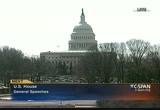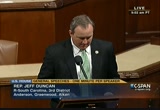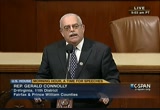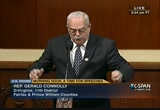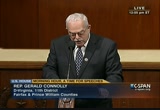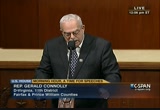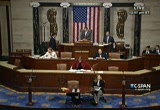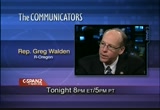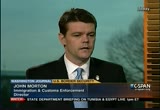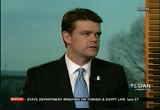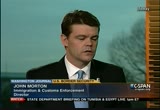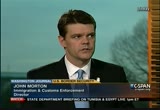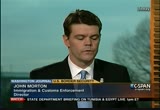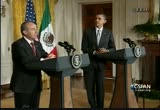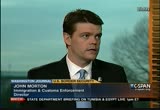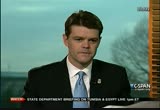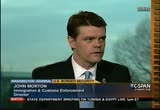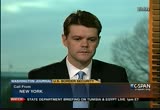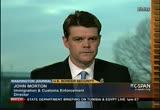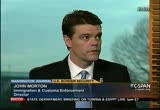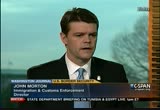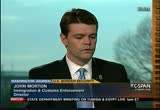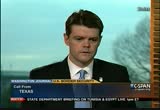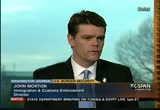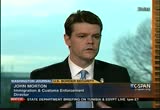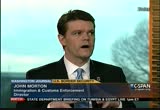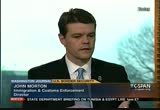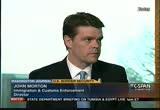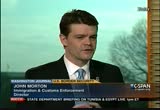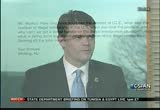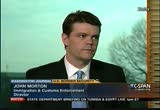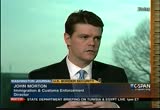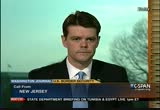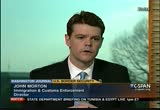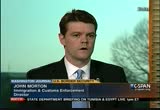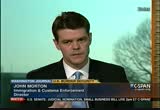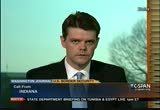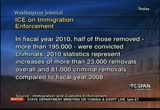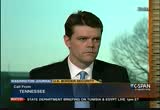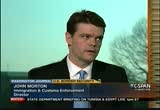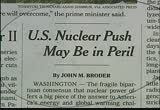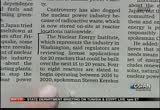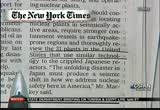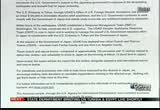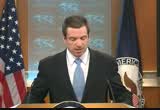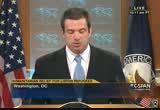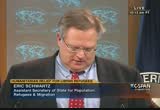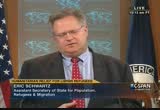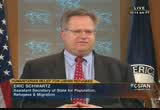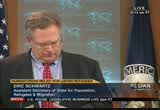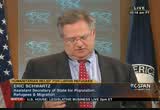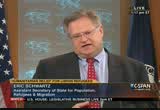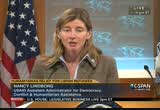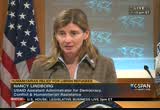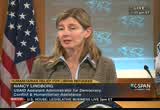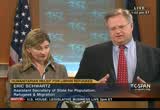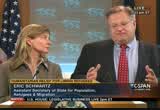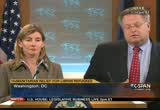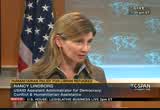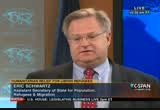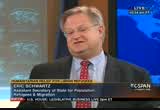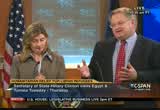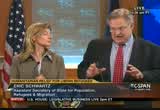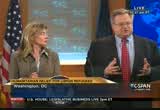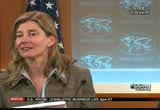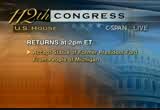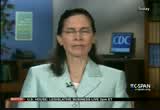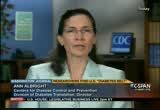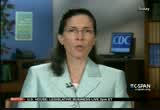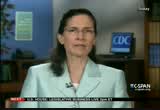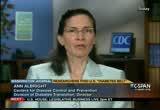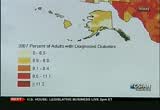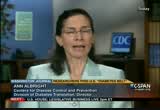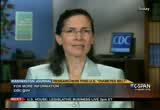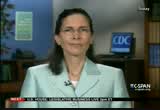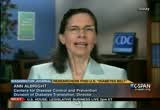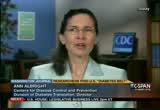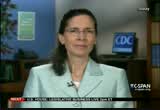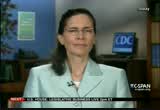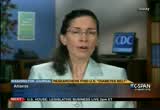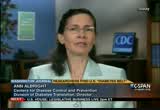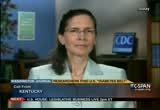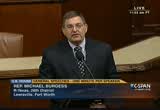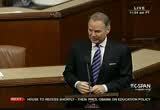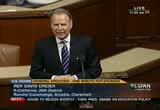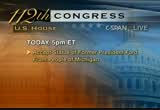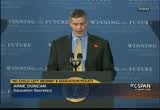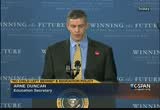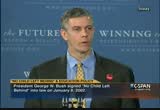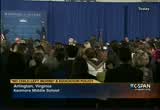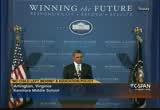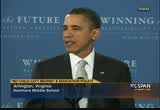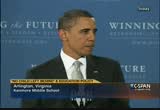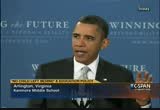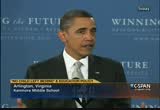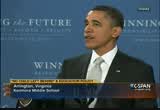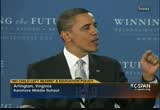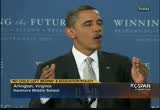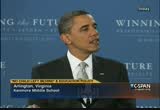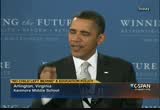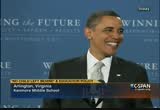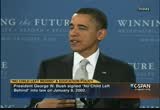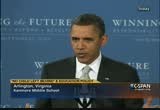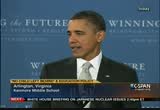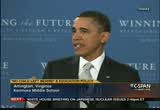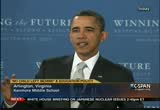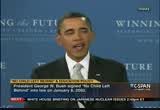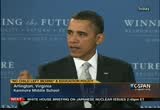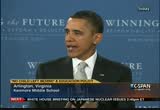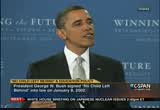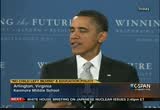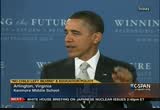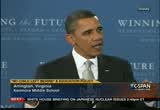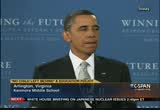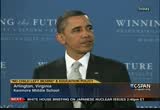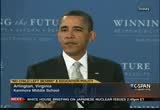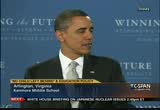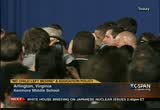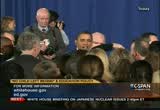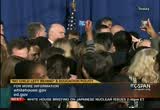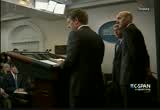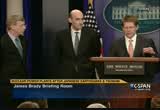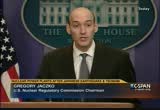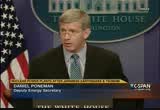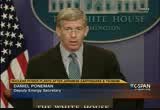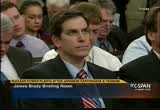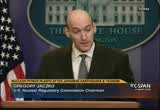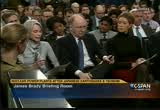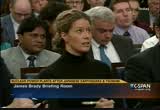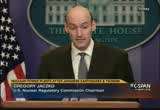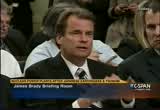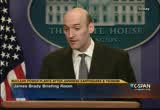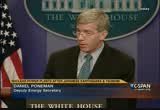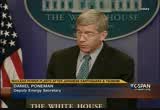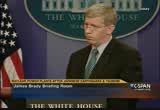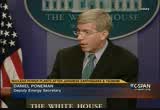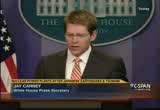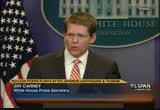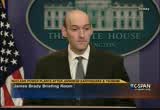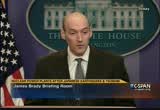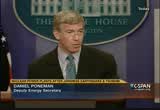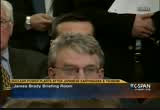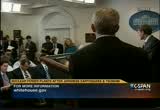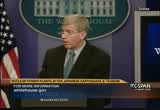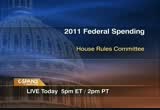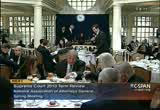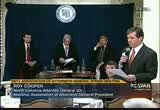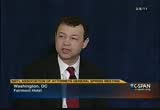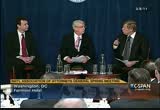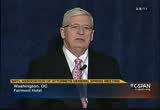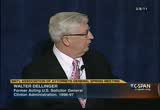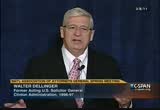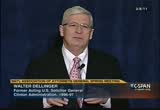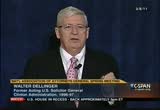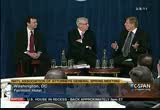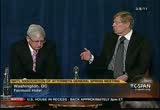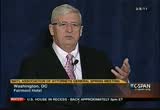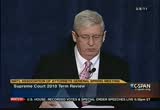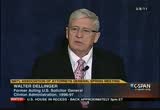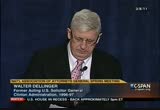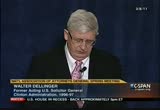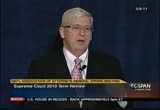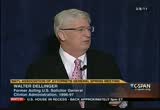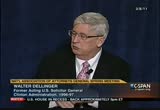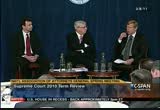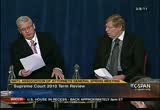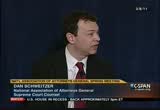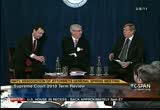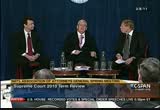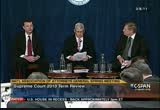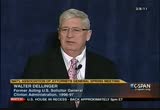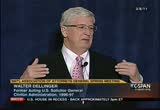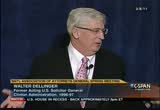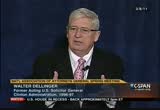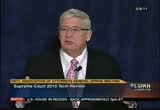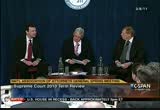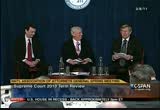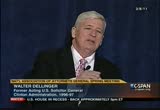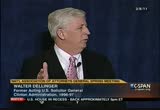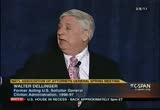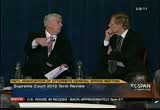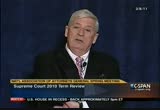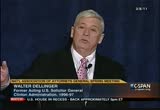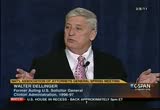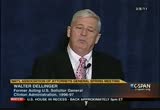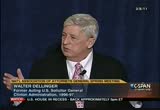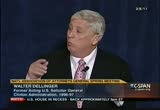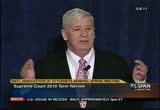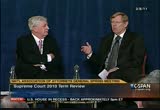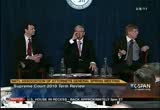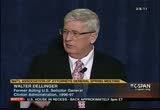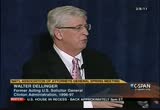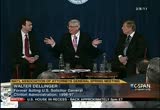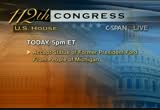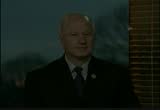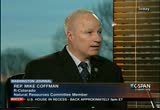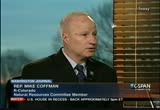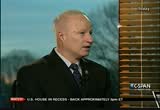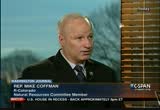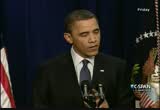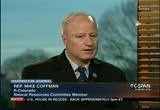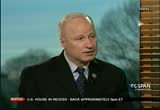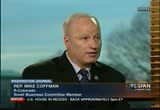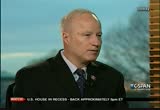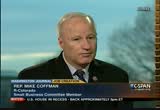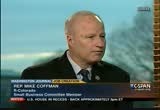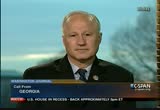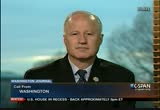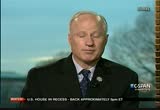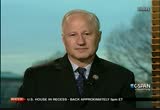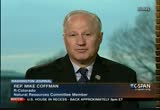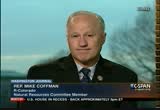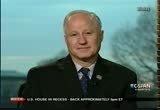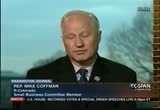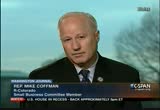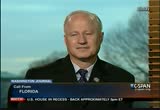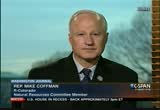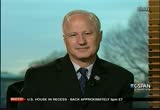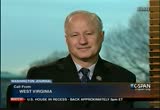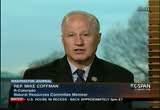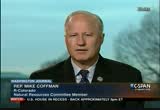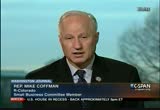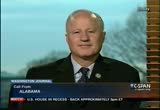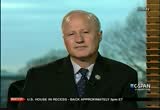tv U.S. House of Representatives CSPAN March 14, 2011 12:00pm-5:00pm EDT
12:00 pm
morning speeches at noon and legislative business at 2:00 p.m. both of those votes at 6:30 p.m. eastern. another temporary spending will be taken up -- spending bill will be taken up tomorrow. it keeps the government running until friday. if approved, the house rules committee will meet for debating the temporary spending measure. that starts at 5:00 p.m. eastern. you will be able to see it live on c-span3. now for live coverage of the u.s. house. the speaker pro tempore: the house will be in order. the chair lays before the house a communication from the speaker. the clerk: the speaker's rooms, washington, d.c. march 14, 2011. i hereby appoint the honorable john campbell to act as speaker pro tempore on this day.
12:01 pm
signed, john a. boehner, speaker of the house of representatives. the speaker pro tempore: pursuant to the order of the house of january 5, 2011, the chair will now recognize members from lists submitted by the majority and minority leaders for morning hour debate. the chair will alternate recognition between the parties with each party limited to one hour, and each member other than the majority and minority leaders and the minority whip limited to five minutes each. but in no event shall debate continue beyond 1:50 p.m. the chair recognizes the gentleman from south carolina, mr. duncan, for one minute. mr. duncan: i ask unanimous consent to revise and extend my remarks. the speaker pro tempore: without objection. mr. duncan: thank you, mr. speaker. i rise today to speak on behalf of the people of the third congressional district of south
12:02 pm
carolina to express our condolences to the folks, people of japan, in the wake of the 8.9 magnitude earthquake that struck off the northeast coast of japan this past friday. and the devastating tsunami that claimed the lives of thousands of people. i visited japan twice. once back in 2007, and again in 2009 where i took my oldest son. it's a beautiful country. and i know the people of japan to be a resilient, general russ -- generous, and hardworking people. in this time of inexpressable suffering and need, please know that the people of south carolina and the people of america stand with the citizens of japan. may god bless them, and may god continue to bless america.
12:03 pm
the speaker pro tempore: the chair recognizes the gentleman from virginia, mr. connolly, for five minutes. mr. connolly: thank you, mr. speaker. mr. speaker, the year-long continuing resolution of the republicans in this house passed last month on a straight party-line vote represents misguided values. house republicans sought to cut an arbitrary amount of funding and did so with a meat axe, indiscriminately attacking worthwhile investments giving no concern to the tremendously negative impact this will have on our economy. in the race for ever increasing and arbitrary cuts, they have demonstrated they know the cost of everything and the value of nothing. moody's says this approach will cost the nation 700,000 jobs. the economic policy institute said 800,000 jobs. goldman sachs said the long-term republican plan would lower economic growth by 2% while increasing, increasing unemployment by 1%. even the conservative group called it a mistake, stating the cutting spending is
12:04 pm
important but economic growth is even more important. -- -- important. the need for fiscal police plin is clear. we must return to a long-term path of fiscal responsibility to reduce deficits, but we must not sacrifice our values and our future all in the name of deficit reduction. where american value health protections the republican kr, slashes funding for food safety and inspection, and national institutes of health. where americans value national security, the republican plan eliminates funding for local police officers and firefighters, protecting our community. and slashes funding for nuclear nonproliferation, air marshals, and customs and border protection. and the men and women in uniform, the republican plan slashes funding to assist homeless veterans. where americans value a focus on job creation, the republican plan slashes funds for job creating and dramatically reduces educational support. where americans value
12:05 pm
transportation improvements, the republican plan slashes funding for infrastructure improvements and eliminates the federal commitment to the washington metropolitan area of transit authority. where americans value clean air and water, the republican plan destroys the nation's long fought environmental protections. according to the organization, republicans for environmental protection, the republican plan represents an unprecedented assault on americans' environment. the republican plan defunds the landmark chesapeake bay restoration effort for example, a joint effort of localities, states, and federal government to protect and preserve america's largest estuary. that plan goes further and repeals long-standing clean water act health protections such as the ability to enact standards forars nix pollution, lead pollution, and acid rain drainage. the republican plan also repeals much of the clean air act, including e.p.a.'s ability to protect us from mercury pollution, soot, and greenhouse gaffes -- gases.
12:06 pm
presumably because if are you not allowed to verify a potential problem it must not exist. where americans value energy independence, the republican plan endangers security by reducing our nation's dependence on foreign oil through improved fuel efishen standards. an agreement to improve by 30% in 2016, will result in american car owners saving $3,000 per vehicle and reduce the nation's oil dependence by 77 billion gallons of gasoline for vehicles produced from 2012 throw 2016. this efficiency improvement will keep 9.9 billion dollars from being sent to opec countries like libya and iran unless the republican plan succeeds in overturning those efforts. mr. speaker, the continuing resolution passed two weeks ago is not responsible. it sacrifices our nation's values, our health, our security, our economy, our
12:07 pm
transportation needs, our environmental plans, and hundreds of thousands of jobs. but now we have a chance to work together in a bipartisan fashion, republicans and democrats working with the senate, to reduce the deficit in the consciencious manner. let's work together to reach a compromise on funding of the federal government that addresses the nation's debt while preserving american values. i yield back. the speaker pro tempore: the gentleman yields back the balance of his time. pursuant to clause 12-a of rule 1, the chair declares the house in recess until 2:00 p.m. today.
12:08 pm
current levels to more live house coverage when the gavel comes down here on c-span. >> tonight, technology and telecommunications policy with the chairman of the house subcommittee on communications on "the communicators" on c- span2. >> despite what passes for conventional wisdom in certain circles, there is nothing radical or in america and in holding these hearings. >> describing evil acts of a few individuals to an entire community is wrong. it is ineffective and risks making our country less safe. >> watch the entire hearing on possible radicalization in u.s. muslim communities, along with
12:09 pm
other events before and after the hearing, including reaction from viewers. all on one on the c-span video library. search, watch, clique, and share. is washington your way. coming up at 1:00 p.m. eastern, a special briefing on the humanitarian situation created by the crisis in libya. we will hear from the secretary of population, refugees, and population and the u.s. a d one administrator. live coverage of 1:00 p.m. eastern. until then, a discussion on u.s.-mexico border security and the safety of border agents from today's "washington journal." "washington journal" continues. host: we continue to talk about border security. the house will take a continuing resolution to keep the government funded up through 2011. they are looking at the 2012
12:10 pm
budget and trying to get agencies like yours fully funded. take a look at this. is that the case? what is the impact? guest: there is both the question of what our budget will look like in 2012. what the budget will look like for 2012 and the rest of this fiscal year. our concern is that this will continue for the remainder of the fiscal year, we will have to make some hard decisions on personnel, equipment, and operations. that said, we are working hard.
12:11 pm
i hope we will get to a good place on both the house and senate side and be able to focus our full attention on next year. strong support for what we do across the aisle. host: what kind of tough decisions would you have to make tax gues? guest: whether we have the same number of agents and officers and can operate as we did before. host: you proposed about 5.8 billion, just over 7% of the total budget of the department of homeland security. what goes into the cost of supporting detention and removal operations? guest: we run a very large and
12:12 pm
unique detention system. we have to go out and construct or rent detention space. that is a costly endeavor. you have to have transportation to move people to endicott from the detention centers -- to from the detention centers. it is a costly process. that is why it is a large part of our appropriations that we use. host: and it would be used for extending the use of technologies. guest: it is a revolutionary approach to identify people that
12:13 pm
are in the nation's criminal justice system that are here unlawfully. we are using the fingerprints taken at the moment of arrest and running them through the database of the fbi and the homeland security database. we can determine if they are here unlawfully in committing crimes -- a and committing crimes. the institutional hearing program is a twist on a similar theme, which is trying to reach people who are to portable from the country for a crime while they are still serving a sentence. if you are serving three years due to a drug offense in a state or federal penitentiary, which tried to reach you at that moment, have a hearing while you are incarcerated, so that when
12:14 pm
you come out, you are released to us, not on the streets. host: the request for 2011, 5.8 billion. the request for 2010, 5.4 billion. -- a 5.7 billion. under this debate over spending cuts, making adjustments here and there, do you cut back like other programs? guest: absolutely. in relative terms, they are not moving very much under our budget proposal for 2012. it is a very small percent increase. our focus is on trying to maintain existing operations. we are not asking congress for
12:15 pm
large increases across our program. we do think it is extremely important, the secretary thinks it is important to maintain operations and our capabilities. it means having agents that can investigate crimes and officers that can remove people from the united states if they are here unlawfully committing crimes in fraud. we are doing a lot of savings, 157 million within our own budget. we want to make sure we are not reducing our law enforcement. host: there was a story about an ice age and that was killed. -- ice agent that was killed. what is going on in that case? guest: one person was arrested due to gun violence by a.t.f.
12:16 pm
i can tell you about the overall feeling. the first to you as agent killed in a long time, the i firstce agent killed in mexico. it is a tragedy. it has brought our team together like we never have before. we need to do what we need to do to hunt the killers down. we are working with the mexicans on this. we end the fbi are assisting as egan and are -- and ththe fbi are assisting as we can't and are cautiously optimistic. host:1 we want to show what our
12:17 pm
viewers had to say about calderon on this issue. >> both governments have taken on positions in the fight of organized crime. it is a paradigm change in our relationship. we want to increase the exchange of information that is unheard of in the past. i want to thank president obama for the clarity with which he speaks. i know together we can achieve greater results. last year when we had the greatest number of achievements in the capture of criminals -- unprecedented number of criminals were caught.
12:18 pm
i also true the value the effort of the united states in the transfer of equipment and training programs added to our efforts -- institutional efforts. this will further our efforts tremendously. i thank you for your support there. host: questions raised about mexico's policy about not allowing u.s. ice agents to be armed while they are in mexico. one paper said the attorney general is considering lobbying for a different policy that would allow u.s. officials to arm themselves across the border.
12:19 pm
has the administration asked for that from the mexican government? guest: it is still under discussion under the administration. mexican does not authorize our agents to carry firearms into mexico. that is true across all federal law enforcement. we are working within the administration in with our friends in mexico to make sure they are as secure as they can be. i expect the decision will be made in the coming weeks. it is not entirely within the control of the united states. it is a question of mexican law and whether at the end of the day, mexico will authorize individuals and law enforcement to carry firearms.
12:20 pm
i know they discussed with president ofc whenalderon calden came. host: independent caller. gary, are you there? cindy, republican in florida. good morning. i want you to get tougher. i think you can create a lot of jobs for women. caller: we need to do something. our country needs to do something, not just in florida, but everywhere. we need tougher laws. guest: thanks.
12:21 pm
the big challenge we face is that there are anywhere from 11 to 14 million people here unlawfully. there is widespread agreement that the present system does not work well. the answers to that is how we reform the system -- there is widespread disagreement on that. we need a strong, thoughtful enforcement. we have to have a country march by the rule of law. the system has not worked well for decades. we have developed a population of people who are here unlawfully. the only solution is unlikely to work. we need some thoughtful approach to reform to try to figure out
12:22 pm
how we can create a sense of lawfulness, a secure border. some of the individuals that have been here for a long time need to get to write with the law. host: democrat line. caller: there is a clear distinction between the north and south border. most people, their concern is that people are sneaking over illegally. people can take jobs from new and what's not. reviewed -- from you and what not. a large percentage of the money spent on this especially of the north end canada, canadians are not sneaking over to america to take our jobs.
12:23 pm
there is the phony drug war spending a lot of money to keep a bag of pot -- it cannot take a job from me. i do not support money wasted in this stupid drug war. i appreciate you keeping illegals out of the country. guest: basic border security is critical. i differ with the caller on the fact of drug enforcement. there are plenty of things going from the united states into canada and vice versa. they are of concern. we need a jointly coordinated border. we are working very closely with a law enforcement officials.
12:24 pm
we have designated law enforcement teams to control the border. we have officers. an interesting time as we go forward with the canadians addressing serious issues of human trafficking, drug trafficking. host: independent scholar. -- caller. caller: there are countless government programs not working and they are thinking about cutting our border patrol by one man. the hearing in the detention centers, that is a waste of money. if they do not belong here, get them out. guest: i think people should be removed from the country if they
12:25 pm
are here illegally and causing crimes. we have to do it lawfully and within the budget that congress appropriates for us. we have to make some very rational judgments about our priorities, who we are going to focus on, and do it to make sure that the people we remove each year make sense for the country. host: how does it work between the federal government, the state level, a an and the ice agents? guest: it depends on what side of the house you are on. one side investigates drug-
12:26 pm
trafficking, a gain, child pornography. -- and gang activity, and child pornography. there are many issues across the country. a delegate some of our authority to state and local enforcement. very few localities' signed up for that. it is a question of just trying to have good working relationships. that is the case almost everywhere. there are some concerns within localities about being perceived as immigration forces. that may inhibit the local police department working with the local community.
12:27 pm
i appreciate those concerns. we are not asking any local agency to conduct immigration efforts. we welcome those that want to focus on gang members affecting public safety. we do not force it on anyone. host: here is what one article says. guest: what that article is hitting on is an issue that has been around for a very long
12:28 pm
time. over 3000 jurisdictions in the united states that arrest and prosecute people, state and local jurisdictions. the agency has never had the resources to be at every single prison or jail in the united states. for the first time, secure communities, the program are referred to, is beginning to hold out hope in changing that through fingerprint technology, we can identify every single person at the moment of their arrest who is here unlawfully and try to respond to that prison, jail, or booking center that does not allow them to get released to the streets. in the past, we did not have enough people to do that when someone was getting released. criminal offenders were released to the strengths -- streets even
12:29 pm
though they could of been deported. we now have special teams that look for criminal offenders here unlawfully. we hit probation, parole, and hit the streets, trying to find them. host: texas. caller: both parties, they come up with excuses. with the border issue, [unintelligible] i am a construction worker. i have been out of work for a good while. these people are taking jobs.
12:30 pm
and some of us that are here cannot do it. guest: we have an electronic verification program to see if their employees are were authorized. it is a good program that works well. there are things we can do to make it work better. the caller hits on a frustration i hear all of the time. good people are out of work. it highlights the tensions between lawful immigration and illegal immigration. we have really focused on employers trying to create a culture of compliance. the number of audits that we have done is at an all-time high. some are getting a lot of
12:31 pm
attention. last year we did over 2000 audits. this year, we will exceed that considerably. the whole idea is to encourage employers to comply with the law voluntarily. if we need to exercise the stick, we will. at the end of the day, the country is a lot better off if we have employers focused on a culture of compliance, making sure the people they hire, whether they are immigrants or citizens, have the right to work in this country and we are not displacing legal immigrants and citizens from good work through cheap, unlawful labor. host: how much are the fines if companies violate it? guest: we collected over
12:32 pm
7 million worth of of finance last year. so it can be " -- of fines last year. it can be quite considerable. there is a scale on whether or not the violation was inadvertent or technical, or whether it was seriously intentional and an example of abuse of hiring practices. we tried to focus on those employers that are engaged in abusive hiring. they must verify the work authorization of the employees that they hire. host: our guest is john morton. he was the acting chief of domestic security and acting deputy security attorney-general
12:33 pm
from 2006 to 2009, trial attorney and special assistant to general counsel to immigration and naturalization services, a graduate of the virginia school of law. many of you may have watched "60 minutes" last night and there was a piece about prescription drugs getting into this country illegally. not only people seeking them out, but also getting into our hospitals and pharmacies. what is ice's role? guest: a serious problem. it is particularly distressing from the case of pharmaceuticals. this is how people are going to be healed, whether or not they will live. we have far too many counterfeiting rings that are
12:34 pm
counterfeiting and inserting them into the regular circle of commerce and displacing legitimate products. ice, we are immigration customs, and enforcement. we are the principal investigators of looking at piracy. we take it seriously. we do a lot of undercover investigations to go after these rings that are counter bidding these things, all the way from lifestyle drugs to cancer, a psychiatric medicines. this is serious business. we have to be all over this. people watching me to take great care. you think you are going to save a dollar or two by buying from a knockoff internet pharmacy, but think again. this is going inside you, meant to cure you.
12:35 pm
host: how can they be sure of that when it is in hospitals as well? how is it getting into hospitals and pharmacies? guest: two things. avoid internet pharmacies. few of them are legitimate. make sure that you are dealing with someone that you know and trust. the other thing is the insertion of counter its into the legitimate supply chain. that is our job. we have to work with the pharmaceutical industry to identify the rings that are doing this from outside the u.s., inserting this product into our chains. host: how much is this a real theern, that this is iin supply chain? guest: it is a real concern.
12:36 pm
things like ball bearings are counterfeited. aircraft engine parts that are counter fit. counterfeit toothpaste. you name it, it is being counterfeit. it is a growing problem that we are only getting a grasp on now. we are spending a lot of time on it at ice, and you will see a continued effort on our part to go after these people. host: how much are we talking about in profits from these prescription drugs? guest: hundreds of millions. host: lawrence in boston. you are on the air. go ahead with your question or comment. caller: i was listening to him say that the american people want to crack down, but who is cracking down on them? who is controlling the police,
12:37 pm
the military from doing crooked things and joining in with the gang members?st you just had a big recall on tylenol, motrin, other things. people have been taking those four years. who is soldan that? guest: -- solving that? guest: i am not entirely clear on your criticism, but the government is trying to do the right thing. i have spent my whole life in federal law enforcement. that has been the case. if the question is who is controlling the pharmaceutical industry and manufacturers, this is a highly regulated industry. the fda is there with strong
12:38 pm
regulatory authority. if there is a crime, we will prosecute. we are not about shielding any part of society from prosecution under the law, if they are committing a crime. host: an e-mail from a be were. -- viewer. guest: lots of questions in there. let me take them in turn. i have been the director of ice for almost two years, confirmed by the senate in may, two years ago. the number of illegal immigrants in the u.s. when i took office was about 11 million, give or take a few, given on the estimate that you focus on. our official estimate is about
12:39 pm
11 million. that number has not changed markedly in the past two years. the number of individuals we have removed from the u.s. has gone up. we have removed more people in the last two years than in any other two-year period in the agency's history. that said, i would caution against an enforcement-only approach. we will move about 400,000 people a year, which is less than 4% of 11 million. it will not do much difference to increase the budget 20% to deal with the entire population with an enforcement-only approach. we need to have a rational set of reforms that promotes strong compliance, a means by which people can come here lawfully,
12:40 pm
and some ability to allow very long time the legal residents to come forward and be right with the law. finally, how do we ensure people are here are working lawfully? that is done through the i-9 audit system in the country. everyone who works must have authorization. everyone must verify their employees have authorization. traditionally, that is done through the i-9, and now we have a e-rarefy. it is a good program. -- we have e-verify. host: mark is an independent caller. calling from new jersey.
12:41 pm
caller: we are looking at approximately 15% unemployment. we have hundreds of illegal aliens standing on the street corner every morning getting picked up to go to work. how do we get rid of these people? i look at it this way. the people standing on the street corner are keeping americans from going to work. everyone who does not go to work is collecting an unemployment check. these are foreign nationals and they are destroying our country by bringing drugs into our country. we need to send them back and quit giving people free handouts. people seem to forget that both parties are selling us out on this. you look at the housing market, everything is a direct result of illegal aliens. host: i think we have your
12:42 pm
point. director martin, your thoughts? guest: we need comprehensive immigration reform if we are going to solve this issue in a way that is complete. in the meantime, we have to have a thoughtful, prioritized enforcement with the resources that congress appropriates. in my view, we need to focus on criminal offenders, next, on securing the border, and third, people that have come here recently and engaged in some kind of gaming of the system. they were previously deported, they came by fraud, they have an outstanding order. then we have to make sure employers follow the law and we create a culture of enforcement. it will be a lot harder for people to come here illegally for labor if they know that when they get here, there will be an
12:43 pm
effort to verify whether or not they have in plummet authorization. if we can create, across the country, a uniform effort by employers to follow the law and make sure the people they hire are here lawfully and have authorization, we will greatly reduce the magnet for illegal aliens. host: "the national journal" reporting that the homeland security committee plans for a hearing where they will question officials on what is being done to address the escalating violence along the border. are you testifying? guest: i am not, but the agency will be. host: what you plan to tell lawmakers about this issue? guest: the question of border security is a challenging one. on the one hand, we have never had more ice agents, more border
12:44 pm
patrol agents, more officers on the border. all-time high. i have been in the business for quite some time and i have never seen the border as secure as it is now. however, i will be the first to say that the situation in mexico is challenging. there is a high degree of violence and a high degree of organized criminal violence that has a direct relationship on our border. we have to absolutely be vigilant. there is a real possibility of continued transborder criminality. possibility for increased and steady violence in mexico. possibility for violence on our side. we have to stay on this. fortunately, we have the best relationship we have ever had with mexico. nearly 20 years in law
12:45 pm
enforcement in this field. i have never seen the cooperation and exchange with mexico the way it is now. there is a frankness and candor to the changes that are hardening. we are doing joint work that we have never done before. there is a real desire within mexico, within the calderon administration, to approach the u.s. differently. the same is true on our part. we recognize that some many of these problems aren't joint problems. these criminal organizations, these blows are going across the border every day. t viewed solely in the prism of mexico or the united states is wrong. we have to think about a jointly managing the border. host: who will be testifying? guest: either the deputy
12:46 pm
director for head of investigations. host: gary in indiana. independent line. caller: thank you for taking my call. in regards to the statement that mr. morton just made, i find ironic that only in the last year or so, seemingly, the fed has gotten so much more serious about our border control issues. it seems like this all happened at the same time that border states, such as arizona, took it upon themselves to get serious when their citizens were being killed. quite frankly, there is too much political hypocrisy.
12:47 pm
democrat, republican, what have you. let's face it. nobody wants to lose the hispanic vote in 2012 -- host: we are going to leave it there. according to your agency, in fiscal year 2010, half of those removed were convicted criminals. an increase of more than 23,000. 81,000 criminal removals' compared to 2008. what happened? guest: we put a major emphasis on criminal offenders. we believe one of the highest priorities for the agency should be promoting public safety. the recidivism rate in the country is between 60% and 80%, depending on where you are. if we can identify and remove
12:48 pm
these people who are committing crimes, we are going to make those communities safer. when we came into office, we set about to focus our efforts on the identification and removal of those people. as you saw from the numbers you just read, the number of offenders we have removed has increased every year that i have been director, and will continue this year. host: memphis, tennessee. estelle. you are the last call for john morton. are you with us? caller: good morning. i have firsthand knowledge. i worked in houston as a banker. i have two comments. the social security administration allows illegals to work under fake ids of american citizens, apply for a green card. when that is approved, the
12:49 pm
social security administration transfers all the credit to this new number. the poor american citizen tries to get help from the irs. secondly, it all changed because every product we buy is now in spanish and english. should we let our prisoners out who committed small drug crimes? illegals go to jail and get out, but others are incarcerated for a long time. it is not fair. check with the unions. you want to know where they are? guest: i do not think there is any meaningful difference between criminal offenders by nationality or background. criminals are criminals. i do not think the sentences
12:50 pm
handed out are different in the way that you suggest. on the contrary, the federal government, as we just discussed, is spending time finding out who is here unlawfully so that they can be removed. over 199,000 last year. we will be over 200,000 next year. i think the callerr will see tht >> u.s. secretary of state hillary clinton will be traveling to the middle east region sometime during the week, and she will be talking to leaders there. at 1:00 p.m. eastern, we will have a special state department briefing on the humanitarian situation created by the crisis in libya.
12:51 pm
we will hear from the assistant secretary for popular -- population and refugees migration. live coverage starting again in about 10 minutes at 1:00 p.m. eastern. we will have it for you here on c-span. until then, your phone calls on nuclear energy in the wake of the earthquake and disaster in japan. on the that thisrning. we will begin with "the new york times" and their head line. "u.s. nuclear push may be in peril."
12:52 pm
12:53 pm
yesterday on the sunday show, senator joseph lieberman, independent, talked about whether or not to have a temporary halt on nuclear power. here is what he had to say. >> we have 104 nuclear power plants in our country. every year, once a year, fema, nuclear regulatory commission, they go through emergency planning to see what they would do if it's a disaster struck. -- if a disaster struck. the reality is we are watching something unfold and we do not know where it is going regarding nuclear power plants in japan right now and then think it calls on us here in the u.s. not to stop building nuclear power plants but to put the brakes on right now until we understand the ramifications of what happened in japan. a host: democrat from morocco, maryland. what do you think about a temporary halt on u.s. nuclear plants? guest: --
12:54 pm
caller: chernobyl still leaking. the american people have the right to make that decision. not the politicians. if you see what is going on in japan, we do not know what will happen -- god bless them. however, i will say take your time and be very mindful of the ramifications. and also i would like to quickly say, good morning to you and good morning to sheila jackson lee and my hero, pj crowley who resigned -- free bradley manning. host: nuclear policy will be on the table at a hearing of -- when stephen chu, energy secretary, and the chairman of the nuclear regulatory commission are expected to testify.
12:55 pm
the ranking democrat, is skeptical of nuclear power, who nonetheless supported expansion as part of the house energy and crime legislation he co- sponsored, said the u.s. needs tougher standards for operating the delaware plants and regulators should consider a moratorium in locating them in seismically active areas -- long island, new york. scott is an independent. what do you think of this idea? are you with us? go ahead, sir. caller: i think we should stop building nuclear-powered plants in the united states now. and for all the people who are going to call up and tell us they are safe and all of that, tell us where you live and we will build one in your backyard. host: what is your experience
12:56 pm
living in long island? caller: they tried to build a nuclear power plant. enough people got out there and protested. there was no way they could be back with long island if there was an accident. the best thing they could have ever done. host: the democrat that we quoted before sent a letter to president obama on saturday. he writes in the letters -- we will go to haymarket,
12:57 pm
virginia. steve, republican. caller: the new or power plants would be more safe. host: where is that one? georgia? caller: no, no, -- china is building a bunch of them. south africa invented them. what it does is it is a funnel over top of a convex for, and if there is an earthquake, -- it will come out and they would dissipate and remove the critical mass. at the nuclear power plant shut down immediately if there is a disaster or terrorist attack. host: mitch mcconnell, the lead republican in the senate, was also on the sunday shows yesterday and he was asked about what should be done on nuclear policy. >> i think what we ought to do right now is concentrate on trying to help our japanese friends after this disaster.
12:58 pm
this discussion reminds me somewhat of the conversations that were going on after the bp oil spill last year. i don't think right after a major environmental catastrophe is a very good time to be making american domestic policy. my thought about it is it is we ought not to make domestic policy based on an event that happened in japan and we ought to concentrate on helping the japanese get past this catastrophe. host: john, a democrat on long island. go ahead. caller: greta? i would like to comment on the nuke problems. if you factor in the amount of fossil fuel it takes to extract uranium, process it, and store it and build the infrastructure of these plants and maintain them, nuclear power is a net loss. regarding to three mile island -- they say there were no loss of lives. dr. sternglass did an
12:59 pm
investigation of the hospital records of the maternity wards after the three mile island disaster a couple of years, and there was an excess of thousands of miscarriages in the hospital down wind from three mile island. so, nuclear power is a disaster. newt gingrich quoted a few days ago saying we have to build smaller nuke plans. i am wondering who is paying his salary. host: you would stop altogether? no. call -- caller: probably the best nuclear physicist in the world -- nuclear power is a disaster. the pollution is here for eternity. we cannot go with this technology. host: hang on the line. a piece by william tucker in "the wall street journal." how nuclear power will lead the agreement allusion and and america's energy odyssey.
1:00 pm
1:01 pm
that last forever. it is actually extraordinarily impossible to think that people 10,000 year -- 10,000 years from now will know what yet the mountain is and what pollution is stored there. it is just a net loss for humanity for eternity. host: robert, independent from washington. caller: good morning. thank you, c-span, for letting me have a say. i think your last caller was exactly right. he was very correct in what he was saying. it i would also like to be able to say that utilities saw the honda years ago by nicholas tesla. he was told at the time when nuclear technology became one of the newest of the day, that he had told albert einstein that it was the most dangerous technology to date for mankind. he told him not to mess with it.
1:02 pm
he said, look here, right now what we have is what we call wireless energy. nicholas tesla created what was called wireless technology -- like a radio. you could be able to send the energy signal through the air waves and be able to utilize it just like a battery. at that time, to my understanding, tesla, he did in fact work with -- i believe it was thomas patterson. finding out thomas edison was a liar and a thief and he was stealing people technology and information and using it for himself. host: we heard mitch mcconnell, talking about the focus rather should be helping out japan in the wake of the earthquake. this is a usaid press release about the media it release.
1:03 pm
initial 100,000 in the immediate disaster relief assistance has been provided as the u.s. government continues to work closely with japan and stands ready to provide additional assistance if required or requested. usaid has deployed two search and rescue teams. one team from fairfax county and the other from los angeles county. comprise approximately 150 personnel and 12 canines trained to detect live victims -- scheduled to arrive in japan this morning here is "usa today" with their story. international aid efforts come together quickly. a massive international relief teams, fundraising efforts, are pouring into a disaster-stricken japan. also, we told you about the search and rescue squads from los angeles and fairfax county
1:04 pm
that are arriving today. olympia, washington. michael is a republican. good morning. are you with us? you are on the air. what do you think? caller: nuclear submarine reactor operator and also a senior chemical engineer. i worked in a lot of nuclear power plants, so i know quite a bit about nuclear plants. the journal will nuclear power plant is not a good thing to compare with the united states- designed power plants. the chernobyl power plants use a thing called positive coefficients where we use negative coefficients in water reactor. that means that as the water gets warmer, it is less effective at slowing down from neutrons, and therefore less effective in causing fissions. when our reactor's heat up, they tend to shut down.
1:05 pm
there is a big difference. the soviet chernobyl reactor was totally the opposite and went into fast flux reaction and it is a totally different design and those of you out there talking about chernobyl being a problem compared to us just are ignorant of the facts. host: let me ask you to compare the japanese facilities that we are seeing exploding -- two explosions the past three days. compare them to what ed markey says are similar technologies and the u.s. at about 31 plants. caller: ok, what you need to understand about a meltdown is this. if you took a straw and loaded it with the sugar crystals and then put a couple of drops of water and let it dry out, you would see what what happened is those crystals would do what you call agglomerating. that is what a meltdown is. it is a big deal for the utility
1:06 pm
but not a big deal to the public. what the agglomeration of the uranium oxide pellets means is that you no longer have predictable reactor physics. that is why you need to replace those fuel rods. it is nothing much more than that. what you are seeing now is a high temperature reaction over there in japan of the zirconium cladding fuel ride -- fuel rods and oxide reacting to this team and get a hydrogen going out and yet every activity. -- reactivity associated with the radiation that has gone through that steam. then you have the explosion. we have containment are around that whole thing still -- around that all things go. a very minimal exposure the public will have in this.
1:07 pm
in spite of all the terrible things you are seeing in the press. the big thing i worry about the press as saying it is a ticking time bomb -- uc that across the bottom. it cannot become a bomber. even if the thing completely melt into the pool in the bottom of the reactor, and you cannot achieve a critical volume to maceration necessary for an atomic bomb. host: why the rush in japan to dump -- what we are hearing is salt water, pouring salt water on to these reactors? are you still there? caller: putting salt water in with boron, boron cut to the neutron flux and helps it shut down faster. at any time you shut down a reactor, there is a thing called decayed heat that goes on majorly for a few hours and then over the next couple of days
1:08 pm
until the heat is completely out of -- that heat is completely out of the fuel rods. basically they just have to attend that for a couple of days and then they would be out of the problem totally. until then, they just basically need to keep it below the 4000 degrees fahrenheit -- fahrenheit range, which it sounds like they have done that because they are talking about a partial meltdown, which just means some of what i described as happened. you are not talking about a pool -- not talking about the china syndrome. that is hollywood. host: before you go, the two explosions were heard already, what happens to those plants? are they useless now or can they come back on line at some point? caller: the sea water inside their rector a lot
1:09 pm
because the chloride stress corrosion bearded engineers will have to evaluate that and fairly flush it to get any chloride out of there. then of course, all of these will have to be refueled because of what i describe it. no longer predictable reactor physics. but it is a big deal for the utility. it should not be a big deal for the public as long as everything is contained. and i would like to point out something calls from the standpoint of nuclear power here in the united states and why we should proceed. i have always objected to the term nuclear waste. it should be called a provisional fuel. in the future, we can take that back out of the glass and we can use it for all kinds of different things. host: just remind our viewers listening to you what your experience. you are an engineer? caller: i am a senior chemical engineer -- which means, as far
1:10 pm
as i'm concerned, also a nuclear engineer because we take the nuclear engineering courses. host: you worked at a nuclear power plant? caller: no, i have worked at quite a few of them and i am an ex-navy nuclear submarine as well. host: you are a >> can see this segment entirety on line. we never to the lives state department briefing. -- we now go live into the state department briefing. >> they just returned from a week-long trip to tunisia and egypt and are here to brief you on special efforts. before handing them the podium,
1:11 pm
i want to respond prefect -- briefly to a number of queries we have gotten about the return of the former president to haiti. the decision to allow him to return as a to the government of haiti. under the hastert -- haitian constitution, he has the right to return to this country. the former president has chosen to remain outside of haiti. we would urge the former president aristed to not come. the government of south africa has generously hosted former president and his family since he voluntarily departed in 2004.
1:12 pm
we encourage the south african government, a committed partner, to urge the former president to delay his return until after the election. with that, i will handover. >> thank you very much. good afternoon. nancy, usaid's assistant administrator for democracy, conflict, humanitarian assistance, and i traveled to tunisia and egypt between march 8th and march 12th. i think that in this business we know that the most significant humanitarian crises do not have ultimately humanitarian solutions. they have political solutions. there is an enormous humanitarian challenge in the
1:13 pm
some 40,000 or more migrants and refugees that have the lead, mostly foreign workers. as president obama and secretary of state clinton have indicated, we strongly support the efforts of the international community and the governments of tunisia and egypt. they have responded effectively, he mainly to this humanitarian challenge. this is really a challenge of getting people come in most cases, to their homes. we visited the tunisian-libyan border in rasjdir.
1:14 pm
we visited people in a camp at the border. as difficult as the challenges that they face, we also witness ed excellent cooperation between the people and governments as well as the international organizations, the u.n. high commission for refugees, the international cooperation for migration, the world food program, and many others. excellent cooperation between the people in tunisia and those people that are operating on the ground. we also traveled to cairo and in egypt. we met with a range of active international organizations and others. the situation in egypt, well,
1:15 pm
let me just go back to tunisia. on the tunisian-libyan border there are about 17,000 foreign workers. 17,000 more or less. looking to build additional capacity there as well. on the egyptian side, there are probably about 5000 or so. again, the vast majority of these people are foreign workers who are waiting on a transport home. the government of egypt is working with international organizations on the border and we are encouraging the government of egypt. there are significant challenges in terms of enhancing shelter in the border area as well as providing for the needs for those who may not be able to go back to their countries of
1:16 pm
origin. in light of those challenges, and also the user -- future challenges we may confront, dialogue in cooperation with international organizations is absolutely critical. we have been deleted in the effort to support these populations. we provided about $47 million to non-governmental organizations to provide food, shelter, medical supplies, both in egypt and tunisia, the border, and in side libya. we have transported from t déjà, to -- to come into their homes. -- from tunisia to egypt, to
1:17 pm
their homes. there is the gratitude for the international community channel of and the efforts of the government of the united states. they were very significant and people were very grateful for what it is we're trying to do. other donors that are concerned about the situation on the ground, we are encouraging them to do more. others need to do more. the challenges are significant and substantial. they will continue in the days and weeks ahead. with that, i will turn the microphone over to my colleague, nancy, who will talk a little bit more and then we will be happy to take your questions.
1:18 pm
>> hello. thank you, eric. we were able to take this trip to better understand the humanitarian needs and the quality of this -- of the response to date. we were able to announce the additional funding that is now part of the $47 million that the government has committed. i want to say something about the commitment we have given to the world food program. it is not only for assistance for those inside libya of, um but for some of those most economically affected in tunisia and egypt. given such the integrated economy, the loss of tourism, loss of trade with libya, and the citizen workers to work to their, there is a tremendous
1:19 pm
outpouring by the tunisian people as well as the government to support those coming across the border to egypt. we have mobilized to provide assistance both to those coming across the borders and to provide assistance inside of libya. we worked with international ngo partners and parts of the u.n. family to provide urgently needed medical supplies instead of libya. we have given two who emergency kits which provides for a population of 10,000 for three months. one of the greatest concerns inside libya are the health needs, both urgent and the primary health care needs, and on going through security
1:20 pm
challenges which is why the emphasis for work inside libya has been on the health and on to its security means. we have deployed a 15 member disaster assistance response team to the region. they are civilian humanitarian experts. there are working to ensure that we are coordinating with the international humanitarian assistance efforts and to track our urgent needs as they evolve. we remain committed to working with all members of the international community. this is a very fluid situation and it needs to continue to evolve. it is important that we all work together on the challenges of this region. thank you. we will take for questions. >> back to the 15 member disaster assistance team, can
1:21 pm
you tell us where they are? you said the disaster relief teams should be going into libya. is there u.s. personnel on their way to libya, ben gauzy, or anywhere else? -- and gaza? >> it is a regional team of 15 people. we are fully prepared and will go in as soon as the security situation permits us to do so. as you know, it is very fluid and rapidly evolving. >> so they are holding somewhere nearby like a multi? >> i cannot go into those details. >> in your op-ed, you are very clear about pointing out that budget cuts for the international affairs budget directly impact of the work that we are doing in tunisia and egypt. can you talk more about that?
1:22 pm
what do you anticipate generally as their needs? how do you plan to about pending those funds? do you see the budget in its current format impending your efforts? >> in an urgent crisis like this, we will do everything possible to ensure that we have what we needed to respond. that means that in addition to the resources that we have in our accounts and the support of other parts of the government, when necessary, it means working very hard to secure contributions from other donors. i think the best way i can answer your question is it to take a step back more generally.
1:23 pm
we are committed to respond to this particular situation with whatever is required, and but around the world we have ongoing humanitarian responses to protracted situations that are not emergencies but are protected and require our engagement and we also have emergency situations. we have accounts for both. it is the future funding of both of those accounts that are so seriously imperiled by some of these proposals. >> do you have enough money to deal with these crises? do you need more money for the emergencies that you are dealing with the? where are we getting it from? >> in the immediate term with this specific response, we will do what is necessary. the concerns that were described in the peace to which
1:24 pm
you refer had to do with the grand scheme of things and what comes next because the cuts to which we referred are dramatic and will impact both these emergency accounts, which have been put to use in this crisis, as well as our regular counts which also have been put to use. >> enterprise funds? >> i beg your pardon? >> are you familiar with that? is that something that your support? >> that is separate from the humanitarian situation. i would add one other key point to the op-ed that we did together what we were there. it was the point down the importance of our values and our national security interests. when these crises hit, we are
1:25 pm
able to provide the kind of humanitarian assistance that is so fundamentally a part of who we are as americans called with a wide is important -- coupled with my it is so poandimportant to help a region going through this historic change. >> is there any larger concern that, depending on the course of events here, that help from the u.s. may not come as quickly as you would like? is it too much too soon that the ngo's already in the country will be able to pick up the slack, as it were? >> we are already and have been for some time pebeen providing assistance to libya through ngo's and other partners. we are able to continue that assistance.
1:26 pm
we are especially looking an immediate health and food needs. >> would you be able to expand those operations as the situation seemingly continues to deteriorate? is there an unpleasant hold pattern on when you can do? >> it is a very rapidly evolving situation in the level and the kinds of needs as well as the security environment. the imperative right now is to be ready to move in a variety of directions. we will respond as the situation permits. >> i just wanted to follow-up. i do not see anything last week about the security situation and a contingency for these teams being sent to libya. i am wondering why that came into the situation. davis said, "we will be spent -- sending teams very soon and to
1:27 pm
libya of." >> clearly, we are always concerned about the security situation of our civilian teams. it is a rapidly evolving situation. >> is there a decision made to not go and in so quickly? >> we are watching this very closely. we have teams prepared. since the security situation permits, we will go in. >> security is always a concern. >> it is just that last week it was, "we will be very soon as sending teams" and now there is no time frame at all. >> is there a time frame at this point? do have a period during which that if you do not get them in that this is not feasible?
1:28 pm
>> i would just echo that security is paramount as in a share -- as an issue. we continue to provide humanitarian assistance. that is not stopping. >> we are looking to go in as soon as possible. >> can you expand on the aid you are providing in libya? are you able to get in the country to your and your partners? you have a dollar figure? a sense of what aid is going on? >> the government has provided a total of $7 million to the international committee for the red cross and about $4 million to various international ngo partners. part of the $10 million to the world "-- the program is for food security. it has been particularly looking
1:29 pm
at the health needs. there has been assistance to the who. i detailed earlier the emergency health kits that provide primary health care needs. so it has been primary health care, assistance for more trauma-related health and medical assistance, it is essential blankets, hygiene, water containers, high-energy food. food, health, basic humanitarian aid. >> said that is a total of $21 million? that is all that is inside the country? i just want to get the break down. is availablelinon to be used for the communities hardest hit on the borders. >> we can try to provide you
1:30 pm
with more precise information, but it is really difficult. it is safe to say that millions of dollars of u.s. support has gone in to libya and to provide food, shelter, and medical supplies and other essential items. because of the ngo and international organizations to which we provide this assistance operate both in the border areas in egypt and tunisia as well it will be difficult to break that down. we can try to get more precise figures. >> ok. >> and in these situations, you want to always have flexibility so that you can scale up as things continue to revolve. once again, this is a rapidly evolving situation. humanitarian needs continue to change.
1:31 pm
in these situations, you always need to have the flexibility to meet those needs as they emerge and that they are identified. >> can you tell us where the aid is going inside the country? how far towards the center of the country have you gotten? and you said this is changing. can you give s a sense of the trend line -- are you seeing an increased need with the government offensive? >> it is primarily in the east. we remain concerned about having better access in the western part of the country. fortunately, because of the rapid mobilization of assistance, some of the most immediate health and food needs were met. we're continuing to provide and watch as needs evolve and change. >> what about the trend line. is it getting worse?
1:32 pm
>> the health and the food needs, i think, are staying relatively -- we're not seeing rapid increases of food insecurity at this time. >> she is referring to this situation in the east. we are concerned about the situation in the west. obviously, we do not have a lot of information about what is happening in the the west, but we have some. we get it from the people who come out and talk to us about it. we get it from some organizations that have spoken to people or who have some involvement inside the country. and the information we have it there is there a serious humanitarian issues in the west relating to medical supplies, food security feu issues.
1:33 pm
they appear to be serious and substantial. in addition, you have seen the reporting about basic human rights and humanitarian issues in the west. all indications are that those are extremely serious as well. >> just a couple more questions. >> about the aid inside libya, does that include the emergency health kits provided by the united states? those now inside libya? >> yes. >> in addition to the humanitarian supplies directly provided by the united states, the blankets, the shelter, that u.s. mental ural -- that u.s. material has already gone into the area? >> part of it, yes. with the response of this nature, you bring it in as the needs are identified. in cooperation with the international humanitarian community, there are supplies that are staged in positioned
1:34 pm
along both borders. >> a new level of confidence is high that it is being properly distributed to the people that need it and not being diverted? >> hr confidence is high in the east. >> -- our confidence is high in the east. >> in the organizations with we have worked, we have worked with for many, many years. they have established careful protocols for the distribution of assistance, even in fragile environments. so i think we can say with a high degree of confidence that the assistance that has gone in is going to good use. >> back to the question of who you are talking to on the borders. there was some suggestion last week that there were concerns the people were not being allowed to leave libya. i am wondering if you have any information backing that up. and are we seeing any change in the makeup of the people who are
1:35 pm
coming across? are they largely third country nationals to begin with or we now seeing more libyans? you expect more libyans with what seems to be a civil war continues and people are pushed out for political reasons. >> you have asked two questions. let me answer the first one first. there has been considerable concern, some reporting, and basically some firsthand accounts which nancy and i got in the border area that people have had difficulties in getting out of libya. there are a variety of reports. first of all, people seem to be subject to confiscation of parts of their cell phones where they can have pictures, the chips in their cell phones, i guess, or
1:36 pm
sim cards. i do not know the exact technology. people have been robbed. having a hard time getting out. in addition, we have heard reports of the kinds of restrictions, such as many checkpoints, at that leave us very concerned that people have faced considerable obstacles and restrictions in getting out. that is a source of very serious concern. in addition, we have also seen it reporting of very serious abuses with human rights and humanitarian principles in libya. that also is the source of enormous concern. >> last question. >> have the ngo's run into any
1:37 pm
problem from the libyan government in carrying on their work throughout the past several weeks? >> they are offered primarily in the east. >> [inaudible] mainly in they're east. >> international ngo's are operating in the east. i do not know the extent to which there may be in a local organizations. there are very serious concerns about the humanitarian situation in that the west. >> i will throw one more out there if you can entertain a question on japan, whether you can give us an update on what the usaid teams have done? >> i know there will be more thorough briefings on this. i was a very quickly that within an hour of their earthquake, we had a response management team
1:38 pm
set up to court and made an interagency governmental response that has been working 24/7 ever since then with 147 people on. there is a disaster system's response team deployed in japan. there are urban search and rescue teams with search dogs as well. i know there will be a lot more specific detail on that later, so i will leave you with that. >> is there an interim assessment from the 24 hours they have been there? >> i do not think we are prepared to do that right now. >> we will have details on that. >> thank you. thank you very much. [captioning performed by national captioning institute] [captions copyright national cable satellite corp. 2011] >> as these officials are just returning from the region, secretary of state hillary clinton will be traveling to tunisia and egypt this week to
1:39 pm
talk with lawmakers at their the recent political unrest there. also, the state department has a new spokesman, deputy assistant secretary mike hammer is replacing the press secretary who resigned over the weekend. coming out in about 20 minutes, we will return to the u.s. house for live coverage this afternoon. members are expected to start at 2:00 p.m. eastern for the prayer and pledge of allegiance. then gavel back out until 5:00 p.m. for legislative business. a couple noncontroversial suspension built on the agenda, including one that would place a statute of former president gerald ford in the u.s. capitol. both are set for 6:30 p.m. live coverage starting at 2:00 p.m. eastern. until then, a look at new findings in diabetes research from today's "washington journal." host: dr. ann albright is the director for the cdc, diabetes
1:40 pm
and disease prevention. she is here to talk about the new study. i have for the viewers a map of the u.s. with a lot of red in about 15 southern states. that is where we have a high concentration of diabetes and have dubbed it a diabetes belt. guest: that is correct. we have been examining the prevalence of the number of people with diabetes in the country. we have been also been looking at county-level data. in doing that analysis, we were able to look at the map in some new ways. this is an opportunity for us to more clearly look at that concentration of red states and to take a closer look at that, and in turn, yes, we have dubbed it the diabetes belt. host: what did you find in these particular states?
1:41 pm
guest: the total number of people that have diagnosed diabetes is higher compared to the rest of the country. the average is about 8% higher than the average. in this area, it is 11% or greater. there are clearly more people with diabetes. we also looked at risk factors in this part of the country compared to those outside. we were able to look a certain risk factors -- not all of them. there are a number that contribute to the development of type 2 diabetes, the most common form. we looked at this part of the country compared to the rest for signs of obesity, a sedentary lifestyle, and were able to determine that about one-third -- and we can account for about one-third of this by modifiable risk factors, another one-third
1:42 pm
by non-modifiable risk factors. host: is this just type 2 diabetes, but also a type one? guest: the way that we collect data, we do not distinguish between type 1 and type two. however, we know from large national surveys that we do and other data analyses that we have access to, 90% to 95% have type 2 diabetes, the others have type one. so the majority have type 2 diabetes, which is a combination of genetics and lifestyle. host: why did the cbc do this study and how much did it cost? -- cdc do this study and how much did it cost? guest: it is our job to be able to monitor and track what is happening, in this case, diabetes. in order to determine what we're
1:43 pm
doing as a country is effective, we need to monitor the problem. this is a major factor in having a surveillance system for diabetes. the cost of this -- i cannot give you a specific cost for doing the study because this is part of national surveillance tool that we use. we make use of the staff that we have at cdc, so this is how we serve the country. this is one of our staff responsibilities, to manage the nation's surveillance system. host: what will happen with this report? will policy be crafted from this? guest: that is our hope. that is why we are providing this to the public, policymakers, a variety of people across the country. we want to identify issues, help those that reside in areas hard
1:44 pm
hit by diabetes. everyone in the country needs to be paying attention to diabetes. this particular area of the country is certainly hardest hit, but it is not the only area. we are prompting people to have action, look at what is happening in your community. consider what you can do to rally together. certainly, for policymakers to examine this, as we are looking at resource distribution. host: diabetes affects 25.8 million people, according to the cdc. the leading cause of kidney failure, non-dramatic limb amputation. let's stick with the price tag. what does that mean for these 15 states and those 144 counties in
1:45 pm
the south when it comes to cost? guest: it is a major concern. diabetes is a costly disease. the cost associated with having diabetes are most attributed to complications. number one cause of kidney disease, number one cause of adult blindness, amputation. those are the crossly attributes of having diabetes. so it is critical to preventing type 2 diabetes, which we know how to do, and it is critical for those who have the disease, to be able to best take care of it, have access to those resources to limit their symptoms. host: we want to show everyone a map of the u.s., the percentage of adults diagnosed with the disease, back in 2007.
1:46 pm
you can see the red color in those southern states you have identified. how did it break down along age, gender, race? guest: when we looked at this data along that belt -- we looked at it there and then compared to the rest of the country. not a significant difference amongst age and gender. there was, as we say, a statistical difference, but not a large difference. what we are seeing compared to those outside the belt, certainly more african-american people are infected in this part of the country. certainly, those who do not have as high of an educational attainment as others in the country. they were also more sedentary and had a higher rate of obesity. those are aspects that describe the population that reside in the belt, compared to outside.
1:47 pm
with the perspective of cost and impact, i hope it will cause us all to stop and take a look at those broader issues going on in our communities that either supports healthy lifestyles, or makes healthy lifestyles difficult to live. host: our first phone call for dr. ann albright is mike. and the independent caller from fon du lac, wisconsin. i hav caller: i have a question and then a comment. what are your guidelines about blood trigger? what about a person to operate in the ninth time and day? what kind of impact will this have on insurance? guest: there are a few numbers
1:48 pm
when you have diabetes. there is a diagnostic criteria. we have three ways that we diagnose. there is an a one c test. if your number is over 6.5 on two occasions, you would be considered to have diabetes. if your blood sugar level is over 126 fast and. you can also have a test where you drink a glucose syrup and they can test your blood sugar. if that is over 190, it would also give you the diagnosis of diabetes. it sounds like what your asking what your blood sugar level should be once you have the disease. it is important to point out that needs to be discussed with your health care team. there are recommendations and guidelines. those can certainly be accessed at our website at cdc. there are different numbers for whether you are in a faster state, but it is important that
1:49 pm
you discussed that with your health care professional. they are recommendations, not necessarily specific to you. if you have other health concerns, you might have issues with low blood sugar, and that may result in wanting to loosen those numbers a little bit. it is important to have that discussion. as far as insurance, it is something that we are all concerned about. people need access to health insurance, life insurance. diabetes can impact that. there are certainly things calling on now that would eliminate pre-existing conditions. employers, if you get your insurance through an employer, are often able to get insurance. but lack of insurance for people with diabetes is critical. you need the tool to take care of yourself.
1:50 pm
there are concerned with life insurance, long-term care insurance, and those are issues that many in the community continue to be concerned about. of the us withose with u diabetes often do not qualify for that part of insurance. host: we are talking about the diabetes belt, a group of 15 southern countries. dr. ann albright is talking about today's report. youngstown, florida. sam is a republican. caller: stan. how are you doing. ? my heart goes out to everyone with diabetes. i live with a diabetic. but i have realized that there
1:51 pm
are some symptoms to being borderline diabetic. i spent the last three weeks in a pretty big learning curve. i went from 424 on the sugar scale. i am down to 122. i walk 5 miles every morning. i do everything i can. it is a different lifestyle that you have to pick up quick. what i want to know is, at this point, if i am averaging between can and 140 aferter meal,
1:52 pm
it be reversed? i keep on moving and moving. guest: and let me ask you some questions -- host: i apologize, i let him go. guest: well, let us try to answer it. the question was reversing diabetes. there are words used like that -- nobody is saying care. at this point in time, diabetes is not curable the best thing to do, as he describes -- certainly paying attention to your food intake, physical activity, but you also need to be sure you are getting some assistance on your support network. diabetes is a 24/7 disease. it is important that you figure out ways to cope with it. if you are on medication, to manage your diabetes -- which
1:53 pm
everyone on a tight one needs to be with insulin. people on tight to may be able to manage it with diet and exercise alone, a group of moral agents, but you could also be placed on insulin. losing weight is key to managing it. for those that are walking their way towards type 2 diabetes, it is critical to delay it. so you may want to reduce or go off medication. it is important to remember nutrition and being active are critical. if you regain the weight, your blood sugars could go back up again. we talk about management of the disease. with your health care professional's guidance, you are able to reduce or go off medications, but that is something that you need to work with them on as you are making lifestyle changes. it is important to maintain a healthy diet and healthy
1:54 pm
physical patterns. it is important that you sustained those. you want to pace yourself as you are looking at ways to improve your lifestyle. i would encourage the caller to -- commend you for what you're doing. it is a big adjustment to get this diagnosis. i encourage you to reach out to support groups to get some more information to help you live as successful as possible. host: you did use the word preventable. this new study is going to be in the april 2011 edition of the journal of preventable medicine. was it a conscious decision to put it in that publication? guest: yes, it is. we want to be sure that we are helping people this disease live as successfully as they can. we have to assess and work going
1:55 pm
on at the cdc to improve the care of those who have diabetes. we need to prevent type 2 diabetes. the numbers we are projecting, what we are seeing -- it is possible to prevent or delay type 2 diabetes, and it is imperative we help the country embrace that message and then to take action to do just that. host: new jersey. democratic line. go ahead. you are on the air. caller: good morning. thank you. my question is, i am concerned when i see that map. these are areas where there are more african-americans living in the country. as we can see here, african americans are very affected by the economy.
1:56 pm
they are one of the populations in the country with less income. this is a relationship between income and diabetes. the second thing, if this is the african-american community that is suffering a large part of this, then we need to change policies for the minorities of this country. guest: there is certainly a relationship between economic -- socioeconomic status and diabetes. particularly, type 2 diabetes. in our analysis, just to let people know, there was too much data that was not available around the economic question to do that analysis. we know from other studies that
1:57 pm
have been done, things that we have worked on, certainly, socio-economic standing is in it. one can certainly walk through that connection. you may have less access to healthy foods, living in neighborhoods that are less safe, less physically active. there is no question we need to be looking at the communities in which we are living in. not all night at the care people are having access to, but when they returned from that setting, what are they going home to and getting access to? it is critically important for us to look at the environments that we are living in. as far as high risk ethnic groups, african ancestry is definitely a group that is at high risk for type 2 diabetes, as are hispanics, american indians, alaskan natives, some asian populations as well. it is important that we not
1:58 pm
disregard these other high risk groups. they are also at high risk. but it should be reminding all of us we have to take a look at the communities we live in, the policies that guide decisions around access to health care, and the ability, once people have access, to be sure that people make use of those tools. diabetes is a manageable disease, but it takes effort and support to do it. it is not only the medical support we need but also the community and family support that is so important. host: some of the states -- alabama, georgia, kentucky, ohio, tennessee, texas. louisville, ky. gramm is an independent caller. -- graham is an independent
1:59 pm
caller. caller: i am in louisville. we have wonderful health care for people. i have lived in other major cities. you know, my glucose is going from 106 to 150, back and forth. i am concerned. i am a native american, a sicilian, i guess european. host: do you get any help from the state, local level to help with the cost of diabetes? caller: i have insurance now. i have to go see a specialist. and you would not believe all the people tha
2:00 pm
>> you can see the rest of this discussion at our website. the u.s. house is about to catch a ball in for the prayer and pledge of allegiance. they will do legislative business, including a couple noncontroversial suspension bills, one that would place a statue of former president gerald ford in the u.s. capitol. votes are scheduled for 6:30 p.m. now live coverage of the house here on c-span. the speaker: the house will be in order. the prayer will be offered today by our chaplain, father coughlin. chaplain coughlin: eternal god, before whom all creation bows, and the father of all in humanity, another week of life unfolds before us. with the breath of spring upon us, may kindness be given fresh
2:01 pm
vision and how to address the needs of your people. as the good steward of national resources, be delivered from alien forces and the tyranny of money. by respecting the goodness of your creation and recognizing your image in each person, make this nation an instrument of peace and an ambassador of reconciliation in your holy name. amen. the speaker: the chair has examined the journal of the last day's proceedings and announces to the house his approval thereof. pursuant to clause 1 of rule 1, the journal stands approved. >> mr. speaker. the speaker: for what purpose does the gentleman from california rise? mr. campbell: pursuant to clause 1 of rule 1, i demand a vote on agreeing to the speaker's approval of the journal. the speaker: the question is on agreeing to the spomplee of the journal. so many as are in favor say aye. those opposed, no.
2:02 pm
in the opinion of the chair, the ayes have it. the journal stands approved. mr. campbell: mr. speaker, i object to the vote on the grounds a quorum is not present and make a point of order a quorum is not present. the speaker: pursuant to clause 8 of rule 20, further proceedings on this question are postponed. the pledge of allegiance today will be led by the gentleman from texas, mr. burgess. mr. burgess: please join me in the pledge to our flag and country. i pledge allegiance to the flag of the united states of america and to the republic for which it stands, one nation under god, indivisible, with liberty and justice for all. the speaker: the chair will entertain requests for one-minute speeches. for what purpose does the gentleman from texas rise? mr. burgess: i ask permission to rise and address the house for one minute, revise and extend my remarks. the speaker: without objection. mr. burgess: mr. speaker, we are coming up on the one year anniversary passage of the patient protection affordable
2:03 pm
care act. president obama during the 2008 presidential campaign repeatedly promised that this would be an open and transparent process. he acknowledged the people's right to know. in fact, he said over and over again, not negotiating behind claused doors but bringing all parties together so that the american people could see what the choices are. so that the american people could see what the choices are, with you instead of doing that -- but instead of doing that, may of 2009, a secret meeting of six special interest groups down at the white house, in september of that year, i began sending letters. in january, 2010, i filed a resolution of inquiry so we could see what went on in those meetings and what the deal was. but unfortunately we were shut down. this year now after new leadership of our speaker and chairman upton and the energy and commerce committee, once again we are asking the white house to voluntarily provide us that information. and what do they respond? they said it would be too vast and expensive. so they acknowledge the information is there. they don't want to go get it.
2:04 pm
is this the type of transparency the president campaigned on? i think not. it's time for the white house to make those documents available to those of us in the house who have been asking for them for almost two years' time. transparency is a two-way street. i yield back. the speaker pro tempore: for what purpose does the gentleman from california, mr. dreier, rise? mr. dreier: mr. speaker, i ask unanimous consent to address the house for one minute, revise and extend my remarks. the speaker pro tempore: without objection. the gentleman is recognized. mr. dreier: back in 1979 after i had narrowly lost my first election to congress, i came to washington and i wept to the "washington post" and i had the opportunity -- went to the "washington post," and i had the opportunity to meet david broder. he kindly took me on a tour of the "washington post" newsroom. spent a half-hour with me. and that meeting left an indelible impression on me. i read the words of the writer and commentator, mark shields,
2:05 pm
who the other day said that david broeder, passed away last week, never fell victim to the disease of self-importance. i heard that he spent a great deal of time with young reporters, here i was young defeated congressional candidate, and he spent time with me. when i have the chance to go on the rules committee, he said, well, it's a great opportunity you'll find, but remember that committee up there is very small by design. it's to keep us in the press corps out. well, i have to say that mr. broeder over the years provided me with friendship and a lot of great advice and his performances before the gridiron were legendary and i know that he's someone who will be missed across the board. mr. speaker, our thoughts and prayers are with the family and the press corps is a lesser place for his passing. the speaker pro tempore: the gentleman yields back the balance of his time. pursuant to clause 12-a of rule
2:06 pm
2:07 pm
or on america and in holding these hearings. >> describing evil acts of the individuals to an entire community is wrong. it is an effective and is making our country less safe. >> watch the entire hearing on possible radicalization in u.s. muslim communities, along with other events before and up to the hearing. it is all on line on the c-span video library concerts, watch, click, and share. it is washington your way. >> president obama today called on congress to pass a bill changing the no child left behind lobby for the start of the next school year. the president agrees with the goals of the bush era laws and said more resources are needed in different techniques required for evaluating school performance. from northern virginia at a middle school, this is 35 minutes.
2:08 pm
>> i was optimistic about what we could accomplish but never managed -- never imagine we would be where we are today. over the next two years, we have seen more change in the education system than we have seen in the past two decades. that is due in large part to the extraordinary courage and leadership of the man i am about to introduce this morning. this president knows firsthand that if you work hard, you get a good education, you can do anything. everything he and the first lady have is because of their education and their hard work. they are both incredible role models for all the students here today, and that is just one reason why i am so hopeful. i am also hopeful because while this president has been fighting two wars and the worst economy since the great depression, he has maintained a focus on education. he understands that we need to educate our way to a better economy, that the nation that out-teaches us today will out-
2:09 pm
compete as tomorrow. and it that we cannot rebuild public education on the same old system of rules and regulations. those of you have a share responsibility to change the rules, eliminate excuses, and hold ourselves accountable. because of this president's courage and commitment, we have saved or created 300,000 educator jobs, increased annual pell grants by $17 billion to send more deserving young people to college, incentivize 41 states and the district of columbia to adopt collagen career-ready standards. encouraged 13 states to alter laws to foster the growth of charter schools. supported 17 states and their efforts to reform teacher evaluation systems. helped nearly 1000 of the nation's lowest performing schools began to turn around and funded some of the most innovative projects in the education field. we all know there is much, much more work to be done. while no child left behind
2:10 pm
helped expand standards and accountability, there's so much more that needs to be fixed. many teachers complain bitterly about the offices on the testing. principles hate being labeled as failures. superintendents say it was not adequately funded. many parents his view it as a toxic brand that is not helping children learn. we need to fix that now, and we cannot wait. [applause] 27% of america's young people drop out of high school. that means 1.2 million teenagers are leaving our schools for the streets each year. 17-year olds to their performing at the exact same levels in mathematics and reading as the were in the early 1970's. just 40% of young people learned two be sheer or four-year
2:11 pm
college degree. for our children and for our country, we must do better. we do need another study. we must simply stop admiring the problems. we need action. i know that, and all of you here today know that. and the map committed to leading us forward knows that better than anybody. i would like to introduce to you my good friend, the president of the united states, barack obama. [applause] [cheers and applause] >> hello, everybody. hello. thank you. thank you so much. thank you. everybody, have a seat. it is wonderful to be here at kenmore, and i want to thank the principal. [applause]
2:12 pm
the superintendent of arlington public schools, patrick murphy. [applause] i believe that the arlington county school board is represented here. where are they? there they are over there. all doing great work. [applause] we have got your own congressman here in the house. [applause] and we have got somebody who i believe it is going to go down as the finest secretary of education we have ever had, arne duncan. [applause] before i begin, let me just say that, like all americans, i continue to be heartbroken by the images of devastation in japan. and i know all of you, young and old, have been watching the full
2:13 pm
magnitude of this tragedy unfold. i want to reiterate america's support for the people of japan, who are some of our closest friends and allies. i have said directly to the prime minister of japan that the united states will continue to offer any assistance we can as japan recovers for multiple disasters. and we will stand with the people of japan in the difficult days ahead. now i just had a chance to talk with some of your teachers as well as some students who told me about your all-school project that is weaving the life and music of duke ellington into your class. and by getting students engaged in learning, you're teaching the kinds of skills about how do think and how to work together that young people are going to
2:14 pm
need in college and beyond. that is what all of our schools need to be doing. and in an economy that is more competitive and connected it than ever before, a good job and a good career is going to demand a good education. over the next 10 years, nearly half of all new jobs are going to require more than a high- school diploma. so if you want a bright future, you are going to need a college degree or advanced training. and as arne duncan mentioned, unfortunately too many students are not getting a world cast -- a world class education today. as many as a quarter of american students are not finishing high school. the quality of our mathematics and science education lags behind many other nations.
2:15 pm
and america has fallen to ninth in the proportion of young people with a college degree. understand, we used to be first. and we now rank ninth. that is not acceptable. turning these statistics around is not just the right thing to do for our kids. it is the right thing to do for our economy. because the best jobs program out there is a good education. the best economic policy is one that produces more college graduates. [applause] for the sake of our children, the economy, america's future, we need to do a better job educating every single one of our sons and daughters. all of them.
2:16 pm
that begins not in our classrooms, but begins in our home. it begins with parents instilling in their kids and only a love of learning but also the self-confidence and the work ethic that are part of success in school and in life. we have to work hard. young people come i am talking to you. i have a couple of them at home. you were going to have to earn it. that means you're going to apply yourself. that, you will learn at home, first and foremost. that is not where the responsibility and. all of us have a responsibility.
2:17 pm
we need to give our kids the best possible education. for a long time, we were not sure about how to give our kids that kind of education. there were a lot of arguments for a lot of years. some people thought if you just put more money into education that it would solve the problem. the other side thought that money does not matter. what we need is reform. there were those who argue that we should just dismantle public education system altogether. rather than working together, both sides remain locked, decade after decade, and not much has changed. something began to change in state and local school districts. instead of getting caught up in these stale the dates, people began to agree that -- you know what? we need more money and more
2:18 pm
reform. we need more resources for the schools, but we have to reorganize how they do business to ensure success for our young people. people began coming together, parents, students, teachers, administrators, reformers, local bushels. we started witnessing amazing success stories of across america. there is a school in denver, bruce randolph, that went to being one of the worst schools to graduating 97% of its seniors last may. in cincinnati, one high school went to handing out one diploma for every five students to graduating 95% of their seniors and preparing them for careers in technology. our goal as an administration and my goal as president has been to build on these successes across america. we know what can work. two years ago, we started doing
2:19 pm
exactly that, trying to figure out how do we incentivize success by starting to fund a competition called race to the top. we are saying to the states, prove you are serious about reform and we will show you the money. because it is a competition for less than 1% of what we've spent on education, it has led over 40 states to raise their standards for teaching, learning, and student achievement. the standards were not developed in washington but by republican and democratic governors of across this country. we have made enormous progress. as arne has said, this is in the most significant reform have seen in a generation.
2:20 pm
we need to make sure we are reaching every child in america, not just those in states and districts to take part in the race to the top. that is why not only do we need to continue this competition, but we need to open and up. many local school districts apply. have -- we need it local school districts to apply. we are going to let you apply. we will take the same bottom of approach rented to -- bottom up approach to no child left behind. we have to reform no child left behind. [applause] over these last few weeks, during what we call education month around the white house, i have been traveling across the country and talking to people about education. we have been doing that for the last couple of years.
2:21 pm
what i have heard, what arne has heard, what the rest of my team has heard loud and clear from teachers, students, parents come and communities is that no child left behind got some things right and some things wrong. the goal of no child left behind were the right goals, making a promise to educate every child with an excellent teacher. that is the right thing to do. that is the right goal. higher standards are right. accountability is right. shining a light on the achievement gap between students of different races and backgrounds, those with and without disabilities, it is the right thing to do. what has not worked in the nine teachers, schools, and states what they need to meet these goals.
2:22 pm
that is why we need to fix no child left behind. we need to make sure -- [applause] we need to make sure we are graduating students who are ready for college and careers. we need to put abstaining teachers in every coster man to give those teachers the pay and support that they deserve. [cheers and applause] i got some applause for that one. [laughter] we need to not only hold failing schools accountable, but we need to help turn those schools around. in the 21st century, it is not enough to leave no child left behind, but we need to help every student ahead. we need every student on an academic path to excellence. [applause] here is the good news.
2:23 pm
i am proud of the commitment by democrats and republicans in congress to fix no child left behind and make this a reality. we cannot afford to drag our feet. as arne said, our kids only get one shot at an education and we need to get it right. i am calling on congress to send me an education reform bill i can sign into law before the next school year begins. before next year's school year. [applause] i want every child in this country to head back to school in the fall knowing that their education is america's priority. we will seize the moment and fix
2:24 pm
no child left behind. [applause] last week, we got a reminder of why it is so critical that we reform the slot. according to new estimates, under the system no child left behind put in place, more than 80% of our schools may be labeled as failing. 80% of our schools. four out of five will be labeled as "feeling." that is an astonishing number -- four out of five will be labeled as "failing." we should be outraged or skeptical. skepticism is somewhat justified. four out of five schools are not failing. what we are doing to measure success and failure is out of line.
2:25 pm
the list those supposedly failing schools includes those making extraordinary progress including 10 more. -- including kenmore. yes, we have more to do to bridge the achievement gap. we have to make sure every student is on track. we can see here at kenmore that you are thriving. you're doing great. you have more work to do, but you're doing fine. [applause] what this means is that we need a better way of figuring out which schools are deeply in trouble, which goals are not, and how do we get not only those
2:26 pm
schools in bad shape on track, but how do we provide the schools the tools to get better? we need to fix the way to measure success and failure. instead of labeling a school a failure, throwing up our hands come and walk away, we need to focus on the schools that need the most help. we need to haul their schools accountable for the success of every trout, black, white, latino, asian, students with disabilities, english-language learners. we need to make sure our best teachers are teaching in some of our worst schools. we need to reward schools letter during the difficult work of turning themselves around. [applause] we are going to have to take a series of steps across a broad range of measures to not only target our most troubled schools
2:27 pm
but raise expectations for all of our schools. first, we're going to have to fix our schools are labeled and identified. we have to do more than that. in recent years, 15 states have lowered their standards to make it easier for their kids to meet the targets set by no child left behind. think about that. that is a pretty perverse incentive. when the states say to themselves, "led to lower our standards so we have an easier time passing those standards so we do not get punished under no child left behind." that makes no sense. that is inexcusable. instead of measuring students based on whether they are above or below an arbitrary bar, we need to set better standards to make sure our students are meeting one clear goal. there are graduating, ready for college, and ready for a career.
2:28 pm
that is the goal we need to set. [applause] to know whether or not our kids are on track, we need better assessments. i want to speak to teachers in particular here. i am not talking about more tests. i am not talking about teaching to the tests. we do not know whether or not a student can fill out a bottle. -- a bubble. we need to know whether or not they're making progress. we need to know whether they are mastering a reading, math, and science but also developing the kinds of skills like critical thinking, creative thinking, that i just saw on display from the students that i met here. those are skills you will need for the rest of your lives. not just to be good workers, but good citizens.
2:29 pm
[applause] now, that does not mean that testing will go away. there will be testing, but the point is that we need to refine how we are assessing progress so that we can have accountability without frigidity. -- rigidity. accountability that still encourages creativity in the classroom and empowers teachers, students, and administrators. we also know that better standards, assessment, and curriculum will make -- not make a difference without outstanding teachers. every day in this country, teachers are doing a heroic job for their kids. every day. [cheers and applause]
2:30 pm
they're taking on the problems of the students in the class, coming in early to rewrite lessons, spending hours after- school tutoring students. by now. my sister is a teacher. -- i know. in south korea, teachers are known as "nation builders." i think it is time that we treat our teachers with the same level of respect right here in the united states of america. [applause] if we are serious about treating teachers that way, if we are serious about educating our kids with an excellent teacher, then we will have to fix no child left behind.
2:31 pm
what no child left behind says is that teachers need to be certified before they step into the classroom. certification can be and in court measure of the quality of the teacher. obviously, we want teachers to be well qualified, but when the quality of a teacher can make or break a child's education, we had to -- we need to make sure our certified teachers are also outstanding teachers, teachers who can reach every last trial. we need to do a better -- every last child. we need to do a better job holding them accountable. we have to stop making excuses for the occasional bad teacher. we will have to start paying good ones like the professionals that they are. [applause] if we truly believe that teaching is one of the most about it professions in a society, and i cannot think of a
2:32 pm
more important for tashard, then we have to start out doing -- of a more important profession, then we have to start value and our teachers. [applause] there are a lot of ways to value teachers. i did not know any teacher who got into it for the pay. the teachers who are here, you got into it for the kids, for the satisfaction of feeling like you're passing on knowledge that these young people will use and carry on for the rest of their lives. we need to reward you by letting you make more of a difference for kids. we need to build on what is being done here at kenmore. give our teachers more time to learn from each other, mentor h. other, more responsibilities in their schools. and to replace the they need --
2:33 pm
the baby boomers, we need to recruit a whole new generation of teachers including the 100,000 a matter science teachers over the next decade. -- math and science teachers. these of the steps we're going to have to take to fix no child left behind. together with what we already doing to make college more affordable, and i am confident these reforms will help us to meet the goal i set when i took office. by the end of the decade, we will once again have the highest proportion of college graduates in the world. we will be number one again. that is my priority. [applause] these steps will require reforms, a change in roles, standards, and attitudes. there is no avoiding the fact that it will also cost some money. fixing our failing schools costs money.
2:34 pm
it requires reform, but it costs money. recruiting and reporting the best teachers will cost money. making it possible for families to send their children to college costs money. after a decade of deficits, there is not a lot of money to go around. by understand that. -- i understand that. we're going to have to cut whatever spending we can cut. i have called on a five-year freeze on annual domestic spending. that will cut the deficit by more than $400 billion over the next decade. it will make that kind of spending a much smaller share of the economy. we will find other ways to get under control. we cannot be reckless and read cannot be irresponsible about
2:35 pm
how we cut. let me make this plain. we cannot cut education. we cannot cut the things that will make america more competitive. [cheers and applause] think about what happens to your own family and when someone loses a job or has a no less, you need to cut back. -- has an illness, you cut back. you watch television instead going to the movies. you start packing your own lunch. there are things that you might do. the last thing you are going to do is dig into your child's college savings. that is too important. you are not going to give that up. what is true for your family is true for the american family.
2:36 pm
[applause] it is the same principles. a budget that sacrifice is our commitment to education would be a budget that sacrifices our country's future. that would be a budget that sacrifices our children's future. i will not allow that to happen. [applause] yes, i am determined to cut our deficit, but i refuse to do it by telling students here who are so full of promise that we're not willing to invest in your future. i do not much to tell these young people than their education is not a priority. -- i do not want to tell these young people that their education is not a priority. katherine says she wants the ability to be who she wants to be. issuance to be a professional violinist for the first woman president of the united states.
2:37 pm
[applause] katherine isn't sure yet. she might do both. you could do it one at a time. professional violinist, president. or roberto. where's roberto? right here. he says with good schools and good teachers, we can grow to be anything we want. [applause] it turns out roberto wants to be the first hispanic president of the united states. [applause] you guys will have to work out the sequence. [laughter] roberto, katherine, and the millions of students like them across the country, they need us to offer them the best education
2:38 pm
possible not only because that is how they will succeed, not only because that is how we go out to be countries around the world, but because that is what we do. that is who we are. that is what america is about. we are a place that plays every child, no matter where they come from, can grow up to be anything they want to. katherine, roberto, or a skinny kid with a funny name like barack obama can grow up to the president of the united states. that is who we are. that is the commitment we make to the next generation. i am confident that if we fix no child left behind come if we continue to reform american education, continue to invest in our children park's future, that is the american we will always be. thank you. god bless you. god bless the united states of america. [applause]
2:39 pm
2:44 pm
2:45 pm
>> good afternoon, everyone. over the weekend, as you know, the president was briefed multiple times of the situation in japan in the wake of the tragic earthquake and tsunami. u.s. aid is leading our humanitarian assistance efforts. with the department of energy, of the department of hhs, the regulatory commission and others. the homeland security adviser is coordinating an interagency process with regards to engaging with the relevant officials across the government. because we knew that you would have a lot of questions about the situation in japan, especially with regards to nuclear issues, and brought with me today the chairman of the
2:46 pm
nuclear regulatory commission who can answer questions about the safety of american citizens in japan as well as generally update americans about the impact of the accident -- or rather, the aftermath of the earthquake and tsunami. that i also have the deputy secretary of energy who can also outlined everything we're doing to assist japan as they deal with the aftermath. with that, i asked the two gentlemen to speak. if you could address questions related to their areas to them and we will let them get out of here and get back to work. i will take questions on other issues. thanks. >> if i could just start with a few points. first and foremost, based on the type of reactor design and the nature of the accident, we see a very low likelihood or
2:47 pm
probability that there is any possibility of harmful radiation levels in the united states, how why a, or any other u.s. territory. u.s., hawaii, or any other territory. the steps they're taking are consistent with the steps we would take care in the united states. we advise americans in japan to listen to and follow instructions by the japanese government with regard to their nuclear facilities. the agency has been providing technical assistance to the japanese government as they are requesting and, in particular, we have dispatched two technical experts to japan and continuing to assemble a team of experts that would be dispatched in the near future. dan? >> thank you, mr. chairman.
2:48 pm
we have been working closely with our colleagues without the interagency -- throughout the department of energy. i just spoke with secretary chu and we have spoken continuously throughout the weekend. we have had frequent meetings in person and frequent meetings of the telephone as we're trying to respond to all of the data we're taking in. we have been in close continuous consultation with the ambassador and hats off to him that he and the team has been doing as they cordate the american response and, as appropriate, for making sure that we share information with our colleagues over at the nrc. we went to consult very closely with our japanese colleagues. we also have dispatched subject matter experts both reactor
2:49 pm
experts and an expert on emergency response. we are in the consultation with them and we will make sure that any requirement that they have that we are rig -- that we're prepared to meet. we are talking to them on a real-time basis as that proceeds. we have technical expertise already there on the ground and we have additional capabilities as needed. they have tremendous capabilities on iran. this requires all of our best efforts and we will assist as required. >> i will call on people. >> can you give us a sense of how president obama is being briefed on the situation in japan? in the plainest terms you can, can you describe the nature of what we're seeing and just how bad it is? >> i would refer you to someone
2:50 pm
else for the president's briefing. >> the president was briefed multiple times over the weekend and was briefed this morning and is being updated throughout the day. the assistant to the president for a homeland security is taking a lead on that and gathering information in coordinating the briefings that the president gets with the relevant officials in the government. >> to the second part of your question, it is a serious situation in japan. the efforts of the japanese government with our elrich assistance, when requested, is to continue to look to ways to provide the ability to keep the reactor cool. that is a process that has been ongoing for some time. we continue to provide assistance where we can. in particular, they have asked for additional types of equipment that will help to provide water and other types of resources to ensure that the
2:51 pm
reactors continue to be cool. >> has there been a partial meltdown in any of these reactors? >> at this time, we do not have the detailed information about the nature of the corps and the reactor itself. it is a situation in which there has been a loss of the normal type of cooling mechanisms to the reactor. as the situation continues to develop, we will get better information. right now, the focus has been a to do everything possible to ensure that the reactor continues to be cool. >> any safety concerns for nuclear facilities in the united states? perspective,nrc's we are always concerned about the safety of power plants in this country. that is always something we do. we always take the new information into consideration and make changes if necessary. right now, we continue to believe that nuclear power
2:52 pm
plants in this country operate safely and securely. i will stop with that point. >> following up on that, any attempt at this stage to assess or carry on a study of the ability of the plants in the united states to withstand an earthquake? at least one of the reactors in jeopardy in japan, is there more concerned about that type of situation pending? >> with regards to the u.s. power plants, the u.s. plants are designed to very high standards for the effects of earthquakes. all of our plans are designed to withstand significant natural phenomenon like earthquake, tornado, or a tsunami. we believe we have a strong regulatory structure in place. as we always do, as an
2:53 pm
independent regulatory agency, we will continue to take a new information and see if there are changes that we need to make with their program. with regards to the fuel, we are providing assistance to the japanese where they requested our assistance. they have not asked for any specific of information with regards to the field. -- fuel. >> you just talked about the high standards domestically. what are the differences between what japan has and what the united states has? >> right now, our focus is on keeping the nuclear power plants in this country secure. we are also putting up a strong focus right now in providing technical expertise to the japanese as they requested. questions about exactly the differences and what changes we might want to consider it is something we will deal with down the road. bottom line, right now we believe the plants in this country are continue to be designed for a very high
2:54 pm
standard for seismic and tsunami events. >> they are calling for more [inaudible] does the president know about these calls for changes in the u.s. over the handling of this issue? what is the time line for that? this is something that americans are concerned about. >> as an independent regulatory agency, we take whatever steps necessary to ensure the safety and security of nuclear power plants in this country. right now, we believe we have a very strong program in place. as we get more information from japan, as this immediate crisis will ultimately comes to an end, we will look at whatever information we can gain from this event to see if there are any changes we need to make. i would just add as a similar scenario following the 2004 tsunami, we did review requirements for nuclear power
2:55 pm
plants and made sure that our plants would be able to deal with that type of event. >> would plants in the united states be able to stand an earthquake of this magnitude? >> i do not want to speculate on anything. >> do you plan to be able to? they tried to estimate what they would be able to withstand, but in japan, this was only built to withstand a 7.9 or something like that. in the united states, are they built to withstand a quake of this magnitude? >> at this point, but i can say is that we have a strong safety program in place to deal with seismic events that are likely to happen at any nuclear facility in this country. as we get past this immediate crisis where we continue to provide support to the japanese, we go gather information about the specifics of the events.
2:56 pm
i do not to speculate too much about what exactly where the relevant factors in japan at this point. >> there is a very low likelihood, your words, of radiation making its way to hawaii. is that based on the condition of the plants right now or based on a partial meltdown or, heaven forbid, a total meltdown? does that change your assessment? >> the lack of any harmful impact to the u.s. is simply based on the nature of these reactors and the large distances, obviously, between those and any u.s. territory. going to havenot any radiological material that could present any risks. >> and even if there is a meltdown, no harm for radiation would reach hawaii what's weber? >> i do not want to speculate, but based on the design and
2:57 pm
distances, it is very unlikely there would be any harmful impact. >> do you gentlemen worry about perhaps an overreaction in this country seeing the nuclear problem in other countries based on policy makers running away from nuclear energy? >> i would refer to dan. >> you just heard very clearly from chairman jaczko that we place since the paramount to nuclear power plants and we always will. that being said, we have to have an energy policy and direction driven by our overall assessment of our country's best interests. in that respect, we're going to continue to seek to diversify our energy supplies. we're going to continue to make sure that each and every one of those sources is as safe as among the possible. we will continue to take all learning into account as we proceed from episodes that happened, hypothetical that we may be able to come up with. it is a matter of our continuous approach to the development of our safe resources -- save
2:58 pm
energy sources to make sure they are done safely. each event does that occur are taken into account, but we do not change from day to day our overall approach to the desire of diversifying our energy posture. and >> and no change in the key components of your diversification? >> a nuclear power has been a key component. we have 104 operating reactors and 26% of the electricity in this country. reducing nuclear power is continuing to plan important role in building a low carbon future. be assured that we will take the safety aspect as a paramount concern and under the independent regulatory authority, going back to 1974, the nrc, which is independent and at arm's length, will ensure
2:59 pm
that we live up to exactly those kinds of high standards that the president wants us to use in the operating the plants. >> it is critical to reaching mission goals, correct? nuclear energy? >> we view nuclear energy is a very important component in the portfolio we want to build for a clean energy future. >> on the moratorium issue. could this put a break for the moment on nuclear power based on what has happened in japan. do you agree? >> going back decades, but every experience that we have with respect to our nuclear power plants are taken into effect. back in march 1979, the three mile island that the said, there were a tremendous amount of learning that we applied to the safety of our fleet. we are much safer today because
3:00 pm
of the learning that has been applied. we continuously hypothesized different scenarios and we never stop our efforts to continue to exercise our capability, assess the possibility, and to ensure that our reactors can operate as safely as possible. we continue to do that and seek to improve by taking the learnings out of this. we know that because of the independence of the nuclear regulatory commission that in the terms of operating our reactors only if they can be operated safely is the responsibility posed in the nuclear >> from a policy perspective, we will continue to operate our reactors and seek to operate safely. we will seek to build nuclear into part of a responsible energy future.
3:01 pm
>> we have the plants to provide the information is still coming and as to how we view safety and security as to nuclear energy as a resource, but it remains a part of the president's overall energy plan it's a vital part of that, and as we get more information and what happened there, that could be incorporated. the right now, we remain committed to the clean energy standard and the other aspects.
3:02 pm
we currently have to nrc technical experts in japan who are working to provide information to the u.s. embassy as well as interface with their colleagues in dead japan regulatory authority. >> with your understanding -- their colleagues in the japan regulatory authority. >> i don't want to speculate on how this may progress. i would say it is a serious situation and would continue to provide whatever assistance is requested from us and is necessary. japan is a technically advanced nuclear country and they possess
3:03 pm
significant technical resource capability on their own. >> the president has not seen anything in japan that would even change his position that the u.s. should increase it in the future chris mark critz is this information still coming in. -- in the future? >> as the information comes in, it will be evaluated. 20% of our electricity is generated by nuclear power, is already a major component of our energy here in the united states. i think the point has been made, we are an independent regulatory authority and we always keep focus on a day-to-day basis on the safety and security of nuclear reactors in this
3:04 pm
country. if we do get information that would cause us to take action, we will take that action, but at this time we don't have any information that would cause us to do anything different with our approach with the current reactors. we will review information as it becomes available. >> of those too technical advisers you have there, are they in tokyo, are they near the facility, are they getting in permission from the japanese government? how would you describe the japanese government's's description of what is going on? are they being forthcoming with both the public and would you? >> our exports are in tokyo in our providing assistance to both the u.s. embassy as well as to interface with our japanese counterparts, and we continue to work to provide resources and assistance as we can. >> are they watching press reports about what they are
3:05 pm
seeing? to what extent are they really hearing what is going on? >> they are providing a valuable resource to us to give us direct information from japan about what is going on. that is coming from a variety of sources. >> the government of japan is very cautious about what it is putting out publicly. they did not have much urgency at the beginning and it has gotten more and more urgent. >> from what i have seen, we continue to see a very aggressive effort to deal with what is a very difficult situation in japan right now. >> cut to supplement that by saying we have been in consultation with the chief cabinet secretary and we have two subject matter experts over there and they are in communication with their counterparts.
3:06 pm
>> have they requested in the specific equipment caused more >> we are ready to provide equipment. as of this morning they -- there may be some additional information the chairman they want to comment on. we have equipment that can do aerial monitoring. that is available. we have emergency response equipment that is available. we are not starting with a blank slate because the japanese already have a lot of equipment and we are just making sure we have all we need to supplement. >> has there been any direct impact and the u.s. support teams that are already in the area?
3:07 pm
>> i would defer that question to a id. they have better information about the teams. the to nrc officials in tokyo have not experienced any issue that i am aware of, but obviously their personal safety is important to us. in tokyo, there is no direct impact from the nuclear incident itself. >> about the logistical challenges of going into the area with such damage? >> i would defer those questions to the folks at aid that we have been working closely with to provide that logistical support. >> our people have not been impaired in their ability to reach out to their japanese counterparts. at the ambassador's request where sinning and other technical expert to join the team. in the context of the coronation
3:08 pm
that mr. brant has been doing from loman perspective, we are working very closely with our colleagues and the pentagon to make sure that any asset from the government's perspective, we can make available whatever assets we have available to them. >> i want to let these guys go for now. >> is the u.s. review its policy [unintelligible] >> i don't know. the first focus in the crisis obviously is getting the coolant to the core of the affected reactors. making sure that the used fuel remains cool properly and so
3:09 pm
forth. from the u.s. perspective, we are still closely evaluating our options and the principal mechanism here is that president obama asked the secretary to convene a high-level panel of distinguished americans. that group will be looking at all the options, and by july it will be coming back to some interim views on the options we should think about going forward. i am sure they would take all these experiences into account. >> [unintelligible] >> in terms of japanese regulations and japanese nuclear waste, i would refer you to the japanese regulatory authorities. >> thank you, gentlemen, very much. thanks for coming. >> the u.s. house returns at
3:10 pm
5:00 p.m. eastern for legislative business, including a couple of noncontroversial suspension bills. one would place a statue of former president gerald ford in the u.s. capitol. see the house live here on c- span. tomorrow members will consider a sixth short-term spending bill for the federal government that would cut about $6 billion of current spending levels and it would extend until april 8. you will be able to see that on c-span3 at 5:00 p.m. eastern. >> tonight, technology and telecommunications policy with chairman of the house subcommittee on communications, represented greg walden, on the communicators, on c-span2. >> right now you can listen to c-span signature programming with iphone or on your md 3 player. the latest books and authors, people in the news, an
3:11 pm
interesting conversation on "q&a". listen to a variety of public affairs broadcasts whenever you want. everything you need to know is on line at c-span.org/podcast. cracks walter dellinger last week predicted president obama as health care law will be upheld by the supreme court. this is the second of the three day meeting the organization held in washington. it is about an hour and 15 minutes. >> we have an all-star panel here to discuss united states supreme court cases for this term. we are on c-span, and my name is roy cooper. i am the attorney general of north carolina. to introduce our panel here, we will have the chair of the
3:12 pm
appellate practice at a law firm. he is visiting professor of law at harvard university and heads the appellate practice clinic. he argued nine cases before the u.s. supreme court in the 1990's. we also have ted olson, a member of his firm's executive committee and co-chairman of the appellate constitutional law group. a former solicitor general of the united states, he is this supreme court advocate and has argued dozens of cases before the court. most of them have contributed to north carolina victories in the u.s. supreme court, and i thank him for that. the national association of attorneys general has our supreme court counsel.
3:13 pm
his responsibility is to assist a appellate litigators to appear before the u.s. supreme court. he excelled at this job. my thanks to all three of you for your time and expertise. dan, i will turn it over to you. >> it is a pleasure and honor to be here to talk about the supreme court. we have to of the supreme court advocates of our time. what we thought we would do is talk a little bit about the court in general and then turn to some of the major cases the court is hearing this term. then hopefully we will have time for some questions from the audience. let's start with the roberts court. it is 2011. it is quite a different court from 2005. it probably win or 11 -- 1112 years without a change in its membership. -- it probably went 11 or 12
3:14 pm
years without a change in its membership. tell us a little bit about how you think the changes in membership has affected the court, held roberts court in 2011 differs from the court that preceded it. >> i apologize for turning my back on those of you over there. you'll have to watch the television screen. this is an interesting route, we cannot see everybody. dan asked me to give information about the court as it presently exists. i did some gathering of statistics, nothing secret here, but i thought it was kind of interesting. as dan mentioned, there have been for appointments in the last five years. previous to that, the court had gone almost 12 years without an appointment, which was the longest time in history without a new member of the supreme court. we have only had 111 justices on the supreme court in the united states.
3:15 pm
44 presidents but only 111 justices, including 17 chief justices. so it is rather interesting that we can have in this country tenure on the supreme court that is so long. the tenure a retirement is getting longer and longer and longer. the justices are holding ochses for a longer period time. the last four justices who did leave the court collectively averaged 28 years each on the court, and their age at the age of retirement on an average was 78 years old. so people are being appointed younger and they are staying on the court longer. you figure if you are on the court for 25 years, that is six presidential term, so the impact of a justice on the supreme court is quite significant. the court sees approximately 9000 petitions every year in grants about 75 to 80.
3:16 pm
so only one of the opportunities actually presents it -- ashley turns into a case before the supreme court. there are more solicitors general, more arguments by attorneys general, as you know. former solicitors general -- in the last 10 terms of the supreme court, former solicitors general had arguments in 357 cases in just 10 terms. in this term, i counted there have been 56 cases are good so far. in those 56 cases, 40 were viewed by persons in the solicitor general's office, either as a party are as a meek as -- or as amicus. the average age now is
3:17 pm
considerably younger than it was four or five years ago when those appointments were made. the average age of justice then was 71. the average age now is 64. eight of the nine justices then had been appellate court judges. justice o'connor had been a state appellate court judge. at the time of brown vs. board of education, only one of the members of the court had been a former appellate court judge in the federal system. there were two or three senators, former attorney generals, the former head of the fcc, and a couple of law professors, but now it seems to be that almost everyone is a former federal judge. there is a remarkable homogeneity on the court.
3:18 pm
people think about diversity, but all nine come from two law schools. six from harvard law school, three went to yale law school, six of them went to the ivy league colleges, and if you look at the nine resume is, you see harvard, yale, and princeton mentioned 13 times. so people are coming from the same place. there are six catholic members of the supreme court now and three jewish members on the supreme court. 50 years ago that was unthinkable. so it has changed enormously. another interesting statistic is, four of the boroughs of new york city are represented on the supreme court. [laughter] justice kelly is from queens, justice ginsberg is from brooklyn, just as sotomayor norris from the bronx, and elena kagan is from manhattan.
3:19 pm
i guess that means the next one will be from staten island. [laughter] we need that diversity. 18 of the 36 clerks this year came from harvard or yale. 20 of the 36 clerks on the supreme court this year had previously clark on the d.c. circuit or the second circuit. 20 of the 36 came from eight specific federal court judges. you will see that the justices and the clerks and the lawmaking in the supreme court are all coming from the same place. you may like that if you are from harvard or yale, or you may not think it is so good if your from the west coast. three women on the supreme court, all from new york city. one more final fact, the supreme court has issued 22 opinion so
3:20 pm
far this term. as is sometimes the case earlier in the term, you see more unanimity at the earlier part of the term because it is easier to write opinions when everybody is in agreement. it seems even more remarkable this year, out of 22 opinions, there were only 10 this sense. -- only 10 dissents. of the justices have written to are three opinions for the court except justice thomas. he has not written a single opinion for the court and here we are in the middle of march. so there are some demographic on the supreme court that tell us a little bit about what the court is or is not.
3:21 pm
>> the fact that the last for justice and to step down had served an average of 28 years, i think five or six presidential terms is too long for a justice to sit. it is a combination of life tenure and a desire to appoint younger members. i am not speaking to any particular judge. [laughter] anything critical i would say, in the of the night is an exception to. i do think appointing justices as a young age, i don't know anyone who should have that responsibility who has not yet had his or her first midlife crisis. i do think the narrow range of
3:22 pm
backgrounds on the court -- they tend to be -- overwhelmingly judicial or academic. professors like ginsberg, kaydin, kennedy, scalia, we see that pattern. " we don't have on the court, since justice o'connor step down, is any justice who has ever held elected public office. i think that is quite strikingly different from the brown court, which as tech mentioned has three former united states senators and a governor of california who had been a vice presidential nominee on the ticket who was expected to win in 1948, rolle warren. there were three justices on that court or maybe four who were told -- who works former president -- who were former presidential contenders.
3:23 pm
justice o'connor had run for elective office. i think it has led to a court that has to much respect for the processes of politics, at the -- accord that thinks more about doctrine and less about one's ability. in that sense i would like to see the breadth of the court expanded in those ways. >> justice scalia has actually commented on that in one of his opinions, calling it the lead, as if we are all coming from the same small law school, educated, new england elite and passing down the this for the rest of the country. of course he is part of that culture himself.
3:24 pm
>> the continued trend with the possible exception of the appointment of justice scalia, every justice that has been named to the court since justice scalia has been [unintelligible] of oral argument than the justice he/she replaced. it is getting to be a virtual cacophony of there. the court is asking 60, 7, 80 questions in a single argument, it is just an extraordinarily intense process of acting -- actinasking questions. while lacking in political, governmental experience an extraordinarily short intellectually, i doubt we have ever had a court that is the eagle of this one in terms of
3:25 pm
intellectual firepower across the board. arguing before justice sotomayor , her first term on the court, i was arguing against an excellent advocate. he made a point that sounded really good, unless you knew that there was a response to its very very deep in the record. i was kicking myself for not anticipating the fact that a skilled advocate would do that in rebuttal, when i would have no opportunity to point out what i of the flaw on that point was. justice sotomayor said but in the third kossel to the second codicil --third hostil the weedso down into
3:26 pm
of the case. it was just an example of how extraordinarily aware of the court seems. people are really stunned to go through morning of a couple of cases and how extraordinarily well-prepared the court is on these matters. justice sotomayor -- justice kagan things to be a very strategic questioner. she has broad a breathtaking sense of the course dynamics to bear. when she asked the question, she goes right to were the critical decision making point is going to be in the case. she does not ask the first questions. that honor usually goes to justices ginsberg or sotomayor.
3:27 pm
she will say i want you to go back and finish your answer to justice kagan's question. the skills she brought to bear -- i was skeptical as to whether those would translate very well in the supreme court, but i think they have. >> i was talking to whatever colleagues last night is that she has been a terrific colleague already. walter mentioned a number of questions, there have been over 120 or 130 questions in a one hour of argument. we are talking sometimes to questions permitted -- two questions per minute. they sometimes don't wait for their colleagues to finish asking questions. they are going full speed, and
3:28 pm
they are all asking questions except justice thomas, who just finished his fifth anniversary without having asked the question. his explanation for that is that i like to hear from the advocates, that is what they are up there for, and not just to hear my colleagues show off. but his colleagues are asking lots and lots of questions. each new appointments is a justice that was more active in questioning on the court. three of the last court justices had argued cases before the courts of roberts, alito, and kagan. i think they argued collectively 63 cases before the courts. their experience as advocates does not make them any more gentle. >> you would think they would show more sympathy for their
3:29 pm
colleagues. john roberts is the first one who comes to that position from a career in which what he did for a living was the one of the best if not the single best advocate before the u.s. supreme court. so he made his mark as professional, figuring out how to come up with an argument that five justices would agree with. i think that brings him to the with ansticship extraordinary skill set that over time will make him an extraordinary potential chief justice. >> let's turn to some of the cases the court has heard this term and decided. last week the court issued decision that i know as the start a lot of people in the country. in of a group of people engaging in a very hateful, ugly protests
3:30 pm
at the funeral of a soldier who was slain in iraq. by one vote, the court held that these people were shielded from tort liability in a suit brought by the father for it the intention of emotional distress. what was the court's thinking there? >> this case involved marine corps glanced -- marine lance corporal matthew snyder who was killed on duty in iraq. his father selects the catholic church in their home town of westminster, maryland, as the site for his son's funeral. this was yet another instance in which the westboro baptist church from topeka, kan., picketed and protested at a funeral. they have done this hundreds of times all over the country. their view seems to be that the united states is overly tolerant of sin and that got killed
3:31 pm
american soldiers as a deserved punishment. signs include saying god hates americans, america is doomed, thank god for dead soldiers. god hates you and you are going to hell, or the signs we see most directed at lance corporal snyder. the family brought an action for various tort liability claims, including intentional if it -- intellection of emotional distress, and prevailed in a jury verdict, including an $8 million punitive damage judgment that was permitted to $2 million. the supreme court held that that action was barred by the first amendment. the opinion by chief justice roberts insists the court's
3:32 pm
sense of sympathy for the family. the chief justice says that the record makes clear that the applicable legal term "emotional distress" fails to capture fully the anguish that westboro's joist added to their already incalculable grieve, but on the legal question of whether the first amendment prohibits holding westboro liable for its speeches, the court held that it did prohibit liability for that speech. i fall as counsel of record for bipartisan group of senators -- filed as counsel of record in support of the family.
3:33 pm
one of the major motivations for filing that brief was to try to defend from any collateral damage in this action the federal military funeral statutes that attempts to protect funerals at both arlington national cemetery and other military fuels from similar disruption and to try to distinguish that also to side with the family in the case. i think with the case turns on, and it is importeant -- the playfulness of the setting it makes the court's first amendment endorsement even more striking and stronger. it shows chief justice roberts to be in a very strong first amendment camp. justice scalia, once again as he
3:34 pm
was in the animal brutality case, is the allied air bases more interest in privacy and other concerns and the first amended -- he is outlier. it possibly also is a narrow decision, however. it raises very serious questions, if you allow toward verdicts in circumstances such as these. as to where the punishment will have a lot to do with hostility toward the ideas or positions of the people who are the defenders in the tort case. that as compared with other kinds of statutory frameworks makes it of great concern, and one of the points that is hard to answer is the point that chief justice roberts made in his opinion, where he said that
3:35 pm
had everything been exactly the same, but the sun said god bless america and god loves you, instead of god hates america and got hates you, then they would not have been subjected to liability. the chief justice use that to show the case turns entirely on the content of what was said. the possibility of the judge -- awarding punitive damages but whether they agree or disagree with the message conveyed. what i want to emphasize to those of you -- this is what we do by falling an amicus brief, the court said we are not deciding on the validity of the 44 state statutes which attempt to protect funerals protest, or
3:36 pm
either of the two federal statutes in question. i think it might be well to take a careful look at your state statutes and at the court's opinion and see if there were the possibility of expanding the statutes and creating a larger buffer zone than 150 fi that is in some of the state statutes. 35 yards is not very far for a family having a funeral. no matter what your message, even if god loves the deceased rather than god hates the deceased, you may not without the permission of the people having the funeral, come within that distance. some years back the supreme court held -- with held a ban on
3:37 pm
residential picketing in an opinion by it justice o'connor. it was aimed at a doctor who performed abortions. others have been aimed at public officials, speaking outside their residents. even on a public sidewalk or in a public place. it is not a jury verdict and it does not depend on what the message is. what you can do to prohibit residential street digging, i am not sure why it would not apply if you are trying to create a neutral time, place, or matter, buckers owner whatever. as i look at some of these statutes, i think they can go further and still pass muster on first amendment grounds, further than they do in terms of their content and terms of
3:38 pm
distances. so take a look at and think about whether there is more than might be done to protect the funeral service while allowing whatever messages there are to be expressed at other times in other avenues and other venues. >> i think that is true, in fact the court mentioned that maryland had passed a statue, but it passed after these events had taken place so the corps was not going to consider them. just a couple of aspects of this case, it is a church, but it is a very small group, and their basic business as the car around the country is one message -- the people that were protesting remembers of the church. the it was the founder and to his daughters and four grandchildren. that was it. they are utilizing the funeral of this service person to draw attention to their message, so
3:39 pm
they were not appropriating a private act -- there were appropriating a private act to get their message out. one of the daughters was on chris wallace's show this sunday. they were on public property, complying with laws. there were 1,000 feet away, and the bereaved could not see anything other than the tops of the signs. so is the very fact specific case, but it is still significant because it is an 8- 1 decision protecting this tasteful speech. it was an 8-1 decision a year ago when the supreme court struck down the statute prohibiting the distribution of films of cruelty to animals.
3:40 pm
the one it descent was justice alito. the supreme court is making a very strong statement with respect to first amendment rights. last year we talked about the citizens united case. there is another one -- this supreme court is going to be a very robust protector of first amendment rights. >> there was a very compellingly written conclusion to the chief justice's opinion. speech is unpalatable. it can store you to action, and as it did here, include great pain. on the facts before us, we cannot react to that pain. as a nation we have chosen a different course, protecting speech on public issues to ensure that we do not stifle public debate.
3:41 pm
>> one thing that is a reminder of is how much facts matter before the court. a lot of people who disagree with the opinion are under the impression that the protesters actually interrupted the funeral, that those attending the funeral or at the cemetery could hear or see the protesters. but the father apparently was unaware of the signs until that evening we found out about it. so is always critical thinking as an advocate about how important you really have to bring the facts to bear in the case. another first amendment case the court has already heard argument in, california was very concerned about violent video games that children playing, some in which the child actually would play the role of torturing someone, raping someone, in the video game itself. the ninth circuit held that by
3:42 pm
the law that says you need your parents' permission violates the first amendment. does the first amendment really give children the right to obtain without their parents' consent these sort of video games? >> well, we will see. [laughter] i have to disclose a bias. i did file a brief on behalf of the entertainment and software association. my client was microsoft, and i participated in the court for the lawyer who did argue the case. i was not able to get to the argument that day, but it sounded like the court is going to be very skeptical of statutes like that. one of the reasons is that it is very difficult to draft its and to be specific. this statute said that violent video games had to be labeled
3:43 pm
as violent. if they were labelled as violent, they could not be sold to people under the age of 17 and lower. what was a violent video game is very difficult to define. there is a statute used, terms that have been used in connection with pornography and obscenity, and hold by california was that violence in and of itself might be put in the same category as pornography and obscenity and not entitled to protection. because the violent video games were defined in terms of material which did not have any redeeming social, artistic, scientific, historic, cultural value, the question is, what does and what does not? if it does and i have any cultural value to a 17-year-old, doesn't have any cultural value to a 2-year-old?
3:44 pm
when the word juvenile is in there, there are all kinds of ways in which the statute is very vague. the court seems unlikely to sing aloud violence. it is all around us. it is in the bible. it is in greek tragedies. we used to play cowboys and indians, but you probably cannot do that anymore. war games, and that sort of thing. children engage in these kind of games. games are an expressive activity, and california did not contest the fact that expressive activity, the games or expressive activity, which is hundred rubric of the first amendment. you cannot distinguish because they are interactive, technically all media is getting to be interactive. we are living in an interactive world. the concern that the supreme court had in the united states
3:45 pm
vs. stevens case, which was the cruelty to animals video about vagueness is the same kind of concern i suspect the majority of the court is going to have with respect to this statute. are we going to discourage activity when you like it or not, is part of society and might be protected by the first amendment. >> this case is not about whether you can make and sell these violent video games. it is not even about whether children can view them or play them if their parents purchase them for them. it is solely about whether they can be sold to minors, or at least that is how it seems to me. maybe the court got off on the wrong track.
3:46 pm
i understand that school to run have some first amendment rights. i don't understand why that state cannot say you cannot sell anything to a minor without their parents permission. >> the ashcroft case had to do with protection -- internet protection of children so you'd have to have filters so children could not see disturbing material on the internet. the facts have some responsibility over what their children or seeing are not, no. one, and number two, if you enact a vague statute that is intended to protect children, you are going to inhibit the production of that material that cannot be downloaded or sold to adults. you have to put the word violence on it or you can be punished $1,000 every time it
3:47 pm
might be plater something like that. the penalties for quite draconian. the brief that we filed suggested that that will cause many factors that these games to pull back and produce different games, which means adults will not have access to the, or they will label them as violent and that will discourage people's views. the court clearly does not like the idea that you can produce a game in hand of an 11-year-old where the whole purchase of the game -- the whole purpose of the game is to torture or murder someone. the court is sympathetic to the marketplace of ideas and not inhibiting what adults can see. >> there was one argument made attacking the law which is that parents have to take responsibility for taking care of this problem, not statutes. it struck me as a very odd
3:48 pm
argument to make, because this stuff is being sold to kids behind their parents back, so they don't have the option. i think the first amendment seems likely to rain here too. >> let's turn to the establishment clause. the court heard one case this term involving an arizona statute that provided tax credits for people who give money to organizations that provide scholarships for private organizations that give scholarships for children to attend private schools, including religious schools. let me ask you to talk about that case. the most important part of the case might not be the underlying establishment clause.
3:49 pm
>> it falls on a christian organization versus -- it is the standing issue. i think this is actually a profoundly important issue, and one i think on which liberals have always been on the wrong side. this is the case involving a tax credit. individuals get a tax credit in the amount that they make a contribution to a charitable organization which provides scholarships to religious schools. the particular organization will be defined by a particular religion. you can get tax credit for giving money for scholarships to catholic schools or whatever the religious faith is. this would raise the question
3:50 pm
whether it violates the establishment clause. the challenge is brought by another taxpayer. this all goes back to the 1960's and the decision in which the u.s. supreme court held that a taxpayer had standing to challenge a federal expenditure program that included aid to religious schools. and that taxpayers had standing even though they could not show that his own tax bill was affected at all. so what is he doing there? i think the erroneous theories was that some tiny piece of his tax dollar was finding its way
3:51 pm
to the university of notre dame or whatever. that is the theory of standing, even though his own tax bill was not affected. i think that was completely of fiction. he had no more at stake in the outcome of the controversy than anyone else, and indeed, our money that we pay in taxes does not go to these programs. we pay tax money just to reduce the amount of inflation. if everybody to be trusted to figure out their tax bill and take it out in cash and burn -- it is entirely of fiction. i think what is troublesome about it is the court felt the only way could resolve the establishment clause issue was
3:52 pm
by making up a case of controversy. i think it turns marbury against madison literally upside-down. chief justice marshall and justify the fact that the court got to rule on the constitution by a very simple device. our job is to decide cases between litigants. we have to decide and to do archaic -- to do our job we have to apply the law. unlike the declaration of independence -- the constitution was intended to be law. we have to apply it. takes precedence over other law. to do our job, we have to interpret the constitution. there is nothing special about
3:53 pm
our black robes. that is our job. by the time it is to chief justice warren, that is turned upside down. he said our job is to be the ultimate clamors of the constitution. there is not -- if there is not a case, we have to make one up. so they did it backwards. i think it would be very useful if a court would say some constitutional questions are not for us to decide. other institutions of government will in some instances be the final constitutional decision makers. i think it would lead to useful modesty on the part of the court to understand there is nothing special about their ability to proclaim the constitution. mccord is too seldom deferential to the constitutional role of the congress or the president, to say to themselves, we get to be these proclaim errors only
3:54 pm
because we have a job to do in resolving disputes. ms. wynn does not like the challenge, but she has no stake in this case and it ought to be dismissed. >> you make some good points, but it is true that justice marshall in marbury vs. madison decided that the law in the jurisdiction to decide the case was not constitutional, so he performed a little magic himself. i did here in a recent case i had in a judge in a federal circuit talking about the various standing issues, saying the supreme court is making up all the standing things that are preventing judges from deciding cases. they are preventing us from deciding what the law is.
3:55 pm
i don't know why the supreme court is inventing all the standing stuff to keep us from doing what really want to do, which is to decide whether things are constitutional or not. >> the ruling that the designated hitter rule is unconstitutional -- we can only hope. [laughter] little bitok a criminal law. this term, the court has heard for for the men in cases and a miranda case. a very active term in criminal procedure. the one decided so far was the confrontation clause case. >> i just want to make one point about the dynamics on the court, which i think is kind of interesting. the confrontation clause is not a big specialty in the law. it has become quite active in recent years because justice scalia particularly feels that
3:56 pm
the right in the constitution to confront the witnesses against one in the sixth amendment means what it says, you cannot have someone coming into court or not coming into court and giving testimony, someone who testified before a grand jury or filled out an affidavit, someone said something to a police officer and they are not there, that evidence cannot come in and call someone to be convicted unless the person is there giving testimony, subject to cross- examination, which is what the confrontation clause is all about. some great history in the earlier opinion about sir walter raleigh's trial, is great stuff. justice scalia feels very strongly about that. there are at least four other presidents discussed in this one case, michigan vs. brian, that was just decided.
3:57 pm
these are confrontation clause cases that have all come up in the last six years. the opinions for the court have all been written by justice scalia, so i really feel strongly about that. so now this case comes to the court, and the situation was that there had been a person at a filling station who was mortally wounded. he was still alive when the police got there. five or six police officers questioned him and in the course didquestioning, he said rick i it read that statement was used against the defendant. the victim was dead by this time, and that statement to the police officers was used in getting a conviction. the question before the court was that a testimonial statement that would be prohibited from use against the defendants if
3:58 pm
the witness wasn't there, and the court came out the other way this time. the second u.s. justice, justice sotomayor wrote the opinion. she distinguished between the purpose for which the statement was elicited. she looked at the facts and said they were worried that this person who had shot this guy was still on the loose. it was a dangerous situation. there were getting this information to protect the public from someone who was out there with a gun. they were not doing it to get evidence to put the guy in jail. so the purpose for the interrogation was not for testimonial purposes, it was for public safety purposes. justice scalia went completely ballistic in his dissent. he is a very acerbic writer, as
3:59 pm
you know. he did not hold back this time. it was his baby being strangled by this brand new justice, even though she had five other boats with her. -- five other votes with her. i want to read some of the language which only justice scalia would use in an opinion and get away with it and still be friends the next day. what did you hear what he said. is the tale, which rendition that the police gave, is so transparently false and professing to believe it demeans this institution. yet it is vain attempt to make the incredible plausible, or perhaps as an intended second goal, today's opinion distorts our confrontation clause jurisprudence and leaves it in a shambles. he says perhaps as an intended second goal, in other words, you
4:00 pm
are intending to wreck everything i wrote in his confrontation clause as. he said instead of clarifying the law, the court makes itself the office gator of last resort -- the obfuscator of last resort. that is just the first few pages. he said the court wrings its hands, if it can the court's opinion is dystopian. then he has a foot net -- footnote defining dystopian. [laughter] decisionf the court's presents a distorted view and offers a revisionist narrative discredited logic, false,
4:01 pm
creates and a logical roadmap, could he leave out? on the decision is short fax and short on the law. i don't know. that is sending a shot across dabel, don't do this to me again. he disagrees with the majority. [laughter] >> it is a very interesting dynamic. justice thomas concurs in the results. there are five who agree on her opinion. it was a five person majority. what is interesting about this issue is the way the court breaks down. this is not what you would normally think of as the most conservatives. the split is between legal lists and pragmatists. the same term -- you had the
4:02 pm
same split in cases involving these citizen guidelines between justices who thought it was unconstitutional to give judges the capacity to make findings not made by a jury that enhanced the degree of incentives. as opposed to the dissenting justices, he said this system does not work. everything has to be decided by a jury. forget what they fought in 1791, this is not a workable system. here was the breakdown in this case is. the five in the majority overturned a criminal conviction. the five were -- the two little l-- legalists.
4:03 pm
then the dissenters in this cases were the four pragmatists. it is interesting to see how that plays out. chief justice roberts and justice alito have taken the pragmatists seats formerly held by o'connor so that the pragmatists group remains. kennedy briar -- breyer -- what has happened is scalia has the gotrity is that he's still justice thomas who concurs in this case. >> on the same buses he has done in all these other ones. -- on the same basis. >> what he has lost is souter.
4:04 pm
he is replaced by a former prosecutor, justice sotomayor. this is the first time we have seen what may be a switch. thomas would have made it inevitable, but you see the first switch with the court moving and coming out with a pragmatic result partly as a result of sotomayor coming in for a suitor. >> you are absolutely right. one thing justice scalia said is when he said the one virtue -- he misnamed the virtue. it makes as easy to decide the way we like to. it makes it easy for it to come out the way we think is fair. that is what you're saying. >> let me turn to a different topic. it appears some stage are
4:05 pm
challenging the health care law. -- some states are challenging the law. it is expected one day this might make the supreme court. when do you think it will make the court? what are your thoughts on what the court will do with it? >> in terms of when it will be decided by the supreme court which is likely but not certain -- there is a possibility it will not go to the supreme court if the court upheld it. there is uniformity among the circuits. the expectations are such that the justices will answer it. that means we will identify exactly when it will be resolved. that will be the last week in june of 2012.
4:06 pm
i say that because the cases will -- assuming their arguments in april and may, that would mean a decision before they break in august and that means this will go on the argument calendar. it does not matter january or february because the court will spend the rest of the term. the decision will not be unanimous. this means the last weekend in june 2012. there is nothing magic about that. that will be it. i am willing to make a prediction and come back here the next two years. i believe not only will the court of hold it i believe it will not be as close as people
4:07 pm
think. i believe chief justice roberts will assign the opinion to himself. one of the reasons i think that is i cannot see the chief justice adopting a constitutional decision that 20 years from now would mean the only way congress could deal with the major social issue is by having a monolithic single governmental system like social security or medicare. it would foreclose using incentives for people to select options in the private market. there is a reason -- there is a reason why if you think there should be universal health care and that is a matter for political debate. there is a reason the proposal was made by republican senators
4:08 pm
which is don't use the model of a single system but encourage participation of the private markets. i think at the bottom of the day it is seen as for closing congress possibility to use market alternatives is one reason. that and at the end of the day i don't think it is that hard. regulating one sixth of the national economy by giving people an incentive to purchase insurance is a regulation of commerce. the intrusion is not so great as to require a carved out from what otherwise would be the application of the commerce power. i think there are easy answers to the slippery slope problem.
4:09 pm
it seems to me less intrusive than medicare and social security which are done under the general welfare clause. in terms of whether it is anything shocking, when you leave your place in the woods and go to work in the economy, only then does the penalty apply to you. you have to earn taxable income above $18,000. then the problem -- then you'll love to enter. you find the federal government has a free decision fund. one is 7.5%. you have to pay that to take care of your old age assistance under the social security benefits. the less you have to pay after 65. 2.5% you have to pay if you don't maintain health insurance
4:10 pm
coverage under 65. no one would say the first two are ok but the third one is astounding. it seems relatively routine and less interested in that unlike social security you have a greater choice of providers you get to choose. the single payer medical -- medicare proposal had always been more liberal and government takeover. i don't have any trouble with the limit in principle. you can say -- it is not so much seen as the regulation of an activity -- inactivity. when the congress in 1792 required everyone to purchase a gun and knapsacks nobody said this is a regulation. they are using the militia power.
4:11 pm
same thing with other affirmative obligations like compulsively schooling. it is relatively rare. you might want a stronger regulation. and not simply say congress can require you to buy a product as to stimulate the economy. unless there is a special justification it is quite simple. and where the cost of acquiring it will be transferred to other persons. just put the statistics on the table for the court. 94% of long-term unemployed have used the health care system. one-third of the costs are paid by the uninsured themselves.
4:12 pm
hospitalization costs paid 10% and 90% is transferred to other people who are sick. that means it is totally different from any other product. a flat screen television -- did congress pass the flat screen television act? you know what is different? it seems like they might make the final four. i have not criticized -- have not bought money for a flat screen television. i cannot say you have to give me a flat screen tv and transfer the cost of others. there is no flat screen emergency act that requires people to pay the cost of it. if there were then you could say congress need to put a stop to this by giving people an incentive.
4:13 pm
we just let people die emotionally because they cannot watch their team. we are unwilling to do that with health care. that is why this financial incentive seems to be easily distinguishable. principle since chief justice roberts will write the opinion what will we with the argument when i testified before the house 17 members said if the supreme court upholds this there are no limits and congress can do anything it wants to read my reaction is that's right. if the court upholds it the congress can do anything it wants if the opinion says we are not holding it until the following principal. noeth limits anymore. [laughter] but there is no chance whatsoever that is an opinion. they would instead emphasize what is unique about the health care market, its role in the economy and the cost shifting that goes on that creates the
4:14 pm
incentive to suggest resort to the private market. >> you had me going until you got to the flat screen part. [laughter] >> i did here right before that he said and you heard it here on television walter dellinger said it would be okay for congress to require people to buy guns so they could defend themselves so the government wouldn't have to pay for police departments, pay less for police departments because you defend your own homes and you have to go out and buy a gun. walter said that so we will have one of those bills pending in congress. [laughter] the other one we will have his -- since we need to have energy independence and one of the way some people say is to have lots of electric cars. you can't have a lot of electric cars a musters a lot of places to plug those in every time you go 40 miles or wherever it is. so we are going to require in order to help energy
4:15 pm
independence and its commerce and in the best interest of the united states and so forth the next car you buy has to be in the electric car because there's a lot of people out there with electric cars and there will be a lot of people where you can plug them in. i'm offering another argument that there has got to be some limit to what the congress can compel you to do for the general welfare. now, i know you have a rebuttal but we are also running short on time. [laughter] i'm going to do what carter philips did to you. [laughter] >> one more thing i'd walter is probably right about timing of this unless the court is convinced on the petition of the circuit court judgment to skip over the intermediate courts because 26 states are saying to the supreme court we've got to know, we have to do planning. some states have legislature's every two years. we have to planning for this. congress has to plan for this.
4:16 pm
to have to resolve that is a significant challenge to a major significant act of congress so let's get it over with you don't need a lot of the advisory opinions from the circuit courts so let's jump ahead of it. and it does come up and it decided in june of 2012. think of what fun that is going to be in a presidential election, the supreme court does or doesn't strike down the health care law so many people are concerned about and lots of people do not like. so in june of 2012 we will have a really terrific presidential election. [laughter] >> whittled we open up to questions. we have a few more minutes if anyone wants to say hello to walter. >> dewey of microphones or should we repeat the questions? >> do we have any questions? [laughter]
4:17 pm
>> [inaudible] >> you know, the question is say in the fourth or the sixth or other places delete including the supreme court, mauney hentges is the judges would be hesitant because they know they would be slowing it down and if any one circuit avoids the review that is the case that will go up. i think sometimes they ordered the review before the argument before the path and that is certainly possible here. i think it's possible to say if they would have review but we are on track for the next term of the court. i don't think the jump over the court of appeals. i hope not. this could use some ventilation
4:18 pm
and the fact is the provision being challenged and it's not going into affect on till 2014. >> i was uncertain whether mr. olson replied to mr. dellinger's observation of what he thought the commerce clause interpretation would be in the court or whether he is silent on the topic. what is your opinion as to what the court will do with the commerce clause questioned? >> i haven't studied it and i don't know. i really have to say i do not know. i think there are good arguments and the have been expressed by walter. there are also good arguments on the cover site. if there is no question this is commerce but that doesn't mean that you can do anything in connection with commerce. and i was trying to make the point that the idea of compelling someone -- if the government had decided to call this a tax and use the taxing mechanism, yes, it could tax everybody in the united states
4:19 pm
for medical cost. there's no question about that, but the administration insisted it wasn't a tax and that language will come back to the arguments, and instead they did it this other way. sometimes when you do something then you can do lawfully into it some other way for political purposes because you don't want the american public to think they are getting the tax you are going to go around it by forcing people to purchase something that they may not need, many people don't need to buy insurance. and it's not like the insurance that you require year when there's a condition to getting the driver's license and getting out and driving a car on the road you're out there. i make the argument like i did that you have coming back to with respect to the electric car or the gums. there is some limit on what congress can compel you to do when it could do it willfully
4:20 pm
another way and i think that as a necessary and proper clause doesn't get you there if you can't do it under the commerce clause. >> the argument got complicated by the fact it had been called the attacks throughout the legislative process. they believe to the changed that tax penalty. and what the president said was it's not a tax increase. people should have insurance, it's the incentive, it's not a tax increase but they did change the word. it remains for the internal revenue code it remains a penalty that runs from $95 to as high as 2.5% of the gross adjusted income capped by the amount that insurance would cost so while even if you couldn't justify the tax the fact remains it is about economics.
4:21 pm
so unlike the law involving u.s. versus lopez that is where the congress is trying to do your job of dealing with the local crime by guns in schools or violence against women and where the court was concerned about using the effect on the national economy from that education or barriers to entering the workforce to matters that were not economic and those were off to one site and that this is a financial penalty and black helicopters don't come and people don't force march you get the bayonet point to the insurance agent it is all economic. it is not local, and that those naked. the argument from the parade which can be cut off and distinguished are always made on the issue whether you have jurisdiction to legislate.
4:22 pm
so if they get $5 an hour the this is the regulation of commerce. the regulation of commerce to say $5,000 an hour this is true. in the social security takes the argument to the supreme court, council said it thickens at the retirement age 65 and require everybody under that to support it they can save 25 or 40. that is the nature of the jurisdiction. every state has jurisdiction to legislate and to require everybody jurisdiction merely 19 times a day. that is the fact that having jurisdiction. the question is whether it is within the scope of a regulation of commerce and you need a limiting principal i think the court is going to have an easy time coming up with one. >> what scared me. [laughter] >> on that note it's unfortunate we have to wrap this up. we are going to meet debt to:15 at our regular meeting room.
4:23 pm
i want to thank the panelists for a very interesting discussion. [applause] >> members are expected back at 5:00 p.m. two suspension bills are on the calendar including one of a statue of gerald ford being presented to the capital. members will consider a short- term spending bill for the government. it would cut $6 billion from current levels and will run until april 8. the house rules committee will consider this later today.
4:24 pm
you can watch this live starting at 5:00 p.m. eastern. >> technology and telecommunications policy with chairman of the house subcommittee representative greg walden on c-span2. a discussion now on house republican plans for job creation from today's " washington journal." host: let me begin with the stories we are seeing at that nuclear power in japan. we are reading that the ranking democrat on the resources committee has called for -- asked president obama to look at the 31 facilities in this country that had similar technology to what japan uses and put a hold on those until we can figure out we are in the same danger.
4:25 pm
guest: the congressman from michigan who is the chairman of the energy committee has asked for a hearing to bring the industry forward and to ask tough questions to say this is what happens in japan. what are the standards in the u.s.? do we have the same risk in the u.s.? this is a pause for nuclear power. i am an advocate for nuclear power. i think only 20% of our electricity derives from nuclear power today. it is much stronger in other countries, but i want to make sure -- i look forward to the hearings in the commerce committee to see what the industry has. clearly the administration has the authority to be engaged as well. ll. host: the energy and commerce committee will take up the hearing on wednesday, i am
4:26 pm
reading in the papers this morning. what would you like to hear? what would reassure you about this power? guest: part of the problem is it may be too early for us to make an assessment. until we really get sort of an after-action analysis as to what occurred in japan and what the defects were, and their regulatory framework in terms of their delivery of nuclear power. it is hard for us to know. i understand the interest in the issue, but it is a little premature in terms of reaching conclusions. host: "the washington post" on sunday had this piece about where nuclear facilities are across the world and where they are close to seismic frisky areas. four of the nuclear power
4:27 pm
facilities, reactors in this country, are in california, which is at risk of an earthquake and a tsunami. would you be open to putting the brakes on some of those facilities that lie along seismic lines? guest: i think once things settle down to where we know what happened and we can look at our facilities and see, are there similar designs along similar lines, and if there are, what corrective measures will we have to take? again, it is kind of early to tell. i am concerned about an energy crisis in the united states, particularly shortage of oil and natural gas in this country where we have reserves that we can certainly produce. but this situation in japan can affect the global economy, and we have a very fragile recovery right now so obviously there is a concern about any spike in energy prices putting this country into a double-dip
4:28 pm
recession. host: do you think the situation in japan with their nuclear facility, does it contribute to the upward track in the oil and gas prices? guest: it may have an impact, in the sense that generally oil is not used for the production of electricity, it is natural gas and coal. what they may do is shift away from nuclear power more to natural gas and coal and that would create a greater demand. it peaked at the same time, this will obviously slow their economy down. it will obviously increase the demand for oil consumption in terms of manufacturing, the overall economy. in a way, that will relax pressures have internationally -- the global market or demand for oil. we have resources in this country. and i think it is incumbent
4:29 pm
upon the department of interior to move forward and allow americans to develop their own energy. host: president obama friday in a news conference says his administration is doing that. i want to show viewers what he had to say and get your reaction. >> first, we need to continue to boost domestic production of oil and gas. last year, american oil production reached its highest level since 2003. let me repeat. our oil production reached its highest level in seven years. we'll production from federal waters in the gulf of mexico reached an all-time high -- oil production. imports account for less than half of what we consume. any notion that my administration has shut down oil production might make for a good political sound bite but it does not match upper -- with reality. >> i think the administration
4:30 pm
has been asleep on this issue. a first of all, they were caught napping when we had the situation in the gulf when they were not doing their job, the regulatory responsibilities, making sure that we were producing oil safely and meeting the environmental concerns. mms was not doing its job and we have a lot to show that. in terms of onshore development, that than the reality -- that the reality is they allow the, i think, a number of bureaucratic hurdles to exist that really slowed energy production, on short and a jeep production on public lands. so, i would certainly disagree with the president then that think the record would show that and i think if he talked to anybody in the industry, i think they would affirm that. and i think we potentially will see a spike in oil prices.
4:31 pm
host: where are you on the issue of whether or not to attack the oil reserves we have in this country? guest: i think that would be a tremendous mistake because that would be only a short-term relief. that needs to be -- a fundamental disruption in supply due to some catastrophic event. we clearly don't have that. so, let's reserve the strategic resource for that purpose. but what we clearly have is a situation where our production has not kept up with demand. we are dependent on foreign sources and we are seeing a steady rise in the price of oil. so, what the president needs to do is say, let's strike a balance between environmental interests and industry interests in terms of allowing -- again, i think americans to produce american energy.
4:32 pm
let's strike that balance. i don't believe we have that balance now in the administration. i think they are too far on the left with the belief they can go to alternative renewable energies that are very costly. certainly in terms of oil -- oil is primarily used as a transportation fuel and not to produce electricity. host: let's move on to what is happening on capitol hill as soon as tomorrow. a house will vote on another continuing resolution to give the government funding. i believe it is a three-week extension be what are your thoughts on the way republicans and senate democrats are governing when it comes to the budget? guest: first of all, the fact that there was not a budget last year when the democrats control both houses of congress and the white house -- they did not produce a budget. so, now we are dealing with continuing resolutions short- term, which is a very bad way to manage government.
4:33 pm
we have done a two-week one. that will expire. the senate does not seem anywhere close. they have not been able to get a bill to the floor. i think what will happen is we will vote tomorrow on a three- week resolution that will have $6 billion in cuts -- host:. guest: we did a two-week one of $4 billion so it seems like we are on that pace. that would be my hope. i think the senate will sign off on it. it is very difficult for anyone doing -- it creates uncertainty for anybody trying to do business with the government in terms of not knowing whether they have a contract with the federal government. that will be honored through the end of the fiscal year. host: house republicans taken over. a lot of a focus on spending cuts. according to a bloomberg poll, when given five choices for the
4:34 pm
most important issues facing the nation, unemployment and jobs ranked first with 43 provides sign -- 43%. it down from a previous poll. but deficits and spending, 29%, up from 25%. but it still ranks. there has been criticism from democrats you are not doing much on jobs and that is what you ran on. guest: first of all, and the demand-side stimulus program offered by the administration and democratic congressional leadership that was focused on the public sector and not the private sector -- $787 billion in the first tranche has not been successful in bringing down unemployment. still stuck at a high rate. what we need to do is lower of the regulatory burdens, lower the cost of business in the united states by laurie taxes and again regulatory burdens. i think we have done that with the 1099, the requirement that
4:35 pm
came out of the health-care initiative that would have produced really a job killing burden upon small businesses. what we are trying to do and working with the democrat- controlled senate, and working with our democrat president, is to do what we can to let where the burdens on small businesses in particular, to allow them -- to give them breathing space to create jobs. in terms of the debt, we have to be honest with the american people that it will rob us of prosperity going forward, and our interest on the debt is over $200 billion a year. it is diverting, i think, dollars that would otherwise be invested in this economy. i think we do have a debt crisis and the united states but we simply have to be honest with the american people. host: kevin mccarthy said
4:36 pm
yesterday said there is more to come from republicans, specifically job creation-type bills. what do you know? what will be on the floor? guest: i think the focus, again, will be on what we can do to reduce -- just the regulatory burdens on small businesses. i think that will be the general focus that we are going to be looking at there. we moved the 1099 issue from the house. so just a number of other regulatory issues. in addition, certain of looking at energy. host: we will move to phone calls. georgia. ibp. thanks for your patience. caller: good morning, congressman. i have a question that i do not think you will be built -- be able to answer it. it is not scripted. the republican initiative has always been less government --
4:37 pm
cut spending and taxes. we want small government. i do not really know if the nuclear reactors are safe or not -- kind of open-minded about it -- but i have a solution. why don't you do this? you are so into small government. they what loan guarantees. if they are so safe, let them get financing from the private sector. of bede government' out and repeal the limiting of liability. if you are really what you say you stand for i cannot see how you can possibly not support those two moves. you and the rest of the republicans. guest: certainly what i stand for -- beyond small government, i think is efficient and effective government. clearly we don't have that today. i think you are right to look at the subsidies for the nuclear- powered industry, as we ought to look at subsidies across the board on all industries.
4:38 pm
alternative forms like wind, solar, ethanol. i would certainly like to take a look at those subsidies and allow various forms of energy -- whether or not they exist, to allow the market to make those decisions. i would agree with you on that. host: bill, democrat from seattle. good morning. caller: i have a question for you. but before i ask a question i just want to say something about it -- you said something about this administration has been asleep when it came to energy policy. i want to say that every administration has been asleep, all the way back to richard nixon or before that. moving on to what i wanted to ask you about, to me it is kind of amazing that these plants that are aging in japan took the heads that we did and we did not end up with a chernobyl. i believe in nuclear energy.
4:39 pm
i believe it is the way to go. in france they have these small nuclear plants, the french model. i was just wondering what you thought about that and what possible future that might have in the united statesguest: fran% dependent upon nuclear energy. from the obama stand point, there are processing into george issues to be dealt with. -- storage issues to be dealt with. once the issue settles down in japan and we get a solid analysis of what occurred and why it occurred, i think it will provide a certain set of benchmarks for the united states in terms of safety for us to
4:40 pm
look at our entire industry. i hope that it turns out that we can move forward in the united states. i think it is a clean form of energy. if we look at things like electric cars and improved data technology, getting a clean source to produce it. host: the associated press is reporting that the fuel lodge at the reactor was fully exposed. guest: i am not familiar enough with that to respond. there are reports that i am reading that particular matter coming out of some of these reactors as they try to cool it
4:41 pm
down with salt water releasing steam from that. some of it is contaminated. that is a concern. host: the swiss government has suspended plans pending a review of the hydrogen explosions at the japanese plants. republican line. caller: i live across the river from one place and we have been told that the dome in indian point may deal with this. one person did a documentary back in 2004.
4:42 pm
if you want to get scared from nuclear power plants, take a look at the documentary. it shows the impact the dome could take. take all of the fuel out of an air force jets and rammed it into a 10 foot wall. guest: living by a nuclear power facility there is a risk imposed. people have concerns that affect the value of land in proximity to the facility. i am sympathetic fair. this is a setback for the industry. the question about it. we will have to look and analyze at it to determine if there are additional takeaways on
4:43 pm
facilities like indian point. and we have to look at what we need to do if we are going to move forward. i hope there are modifications that we can make if necessary on existing facilities. i hope we can move forward. we will have to find out -- we are a long ways away from the understanding the safety implications, based on what is happening in japan. host: expose means not covered by water. when exposed, they tended to overheat. caller: there is some type of
4:44 pm
misunderstanding. i hear republicans talking about spending in the government. i believe there is more of a revenue problem in a spending problem. focus more on job creation and there would not be much of a problem about spending if more people were working. there has not been any specific job creation bill that i have seen. the congressman can answer specifically, is there going to be any specific job creation deal? guest: republicans only control
4:45 pm
one house in congress. i think both parties want to do all we can to stimulate job growth. we wanted to have a collateral effect on the private sector. we want to put more money in the hands of business and tax relief and creating jobs without additional money. we have gone down in the demand side. now we want to go down the supply side of lowering the costs in the united states. i think we did it by initiating rule.eal of the 1099 wil
4:46 pm
that is incredibly burdensome. now we are trying to repeal certain provisions of obama care. we want to reduce the rate on businesses as well. we want to make america more competitive and global. host: democrat, in orlando, florida. caller: someone earlier said albert einstein died and he was not aware of the dangers of nuclear power plants. he died in the 1950's and he was aware of the potential dangers.
4:47 pm
i remember when nuclear waste was enclosed in summit containers in dropped in avert oceans. they do not go away. we are leaving time bombs for future generations. this is a very selfish if we do not care about what happens to the world 500 years from now, as long as it does not affect us. in the 1980's, one person said he liked to see the elimination of all nuclear weapons. he wished that all nuclear plants would be removed. host: talk about the connection she made between nuclear power plants and nuclear bombs. guest: they are separate and very different. we understand the storage of
4:48 pm
nuclear waste material into the technology and the concern of it falling into the wrong hands. we have used nuclear substances safely in our aircraft carriers and submarines. host: phoenix, independent scholar. caller: everyone keeps saying it only produces 20% electricity per carrier. congress should use business skills -- [unintelligible] have a good day.
4:49 pm
guest: 20% of of energy is electrical produced by nuclear power plants. then call and natural gas. we are looking at alternative forms of energy such as wind and solar. caller: i listened about the epa and all of this. then i hear class warfare, look at this. as far as i am concerned, obama cut our jobs off by using the epa. he thinks we are stupid that we do not realize he is doing this.
4:50 pm
[unintelligible] it does not happen overnight. you can make it safer, and we can put people back to work. how many people could go back to work in alaska that has to live off of food stamps. how many people out in california could go back to work? how many people on the north east? host: we get your point. guest: the cabin trade bill was designed to raise energy prices for fossil fuels in an effort to ship it to alternative sources.
4:51 pm
we have a clear problem. we import the majority of our oil from sources that may not be reliable. we have resources inside of the united states. we can responsibly developed them. we have policies that are balanced environmentally. this the administration needs to adjust its policy to allow for it. host: international aid efforts -- come together quickly for japan. what are your thoughts on this? any concerns that we are stretched too far given that we are in afghanistan and other
4:52 pm
countries? guest: we have a sizable presence with the united states marine corps and the air force in okinawa and some facilities in mainland japan. we are utilizing those forces already in the region. we are not to. others of paramilitary assets. host: to you suspect the chairman of the armed services committee will be taking some of our resources over to japan? guest: we have been in discussions about what to do with our forces there in the first place. there were issues with japan wanting to move our forces from okinawa.
4:53 pm
it will be interesting to see with this incident how our forces are perceived and have they are involved in humanitarian issues in japan. it is a great move for this country. host: what does it mean for possible pentagon cuts putting more resources in japan? guest: those assets are already in japan. i am in iraq war veteran. i think i have a role as a conservative on this committee in terms of looking at defense cuts. the military today -- there is a
4:54 pm
big bureaucracy that needs to be slimmed down. we need to look at some of our weapons system programs. there are question marks about it. i think every dollar wasted in defense is an option to defend the country. host: next caller. caller: i would like to remind republicans that are so critical of this administration that when it took office, they walked into a number of messes. messy wars that were not paid for. a collapsing economy in which
4:55 pm
employment was losing thousands of jobs each month. and a decimated interior department to run by secretary cheney's energy policy that no one was made aware of. guest: the first issue was that the administration came in with the circumstances with an economy in free fall. it has not produced what they said it would. they talk about inheriting the situation in iraq and afghanistan. i think that is true as well. this administration double down on the bush policy in afghanistan. i believe that we have security objectives and they need to make
4:56 pm
sure the country does not fall to the taliban. they want to strike al qaeda targets. we have gone far beyond that into a world policy with nation- building. it has been at the expense of taxpayers. i think the third issue is when this administration took office, it was a mess. the secretary of interior said there was a mess, but it did not get there to clean it up. he knew there were problems in
4:57 pm
office. now we are left with the situation we are in now. they cannot allow one americans to develop on public lands. as far as i'm concerned, the administration failed on all three. caller: i have mixed feelings about nuclear power. [inaudible] the republican party is against obama care. what makes that fair for us to pay your health insurance and yet i cannot have health insurance? guest: i get my health insurance through the congress of the united states.
4:58 pm
you are right. government employees enjoy a better benefits than citizens in the united states. the military system is better called caitri-care. caller: who builds a nuclear power plant in japan? host: i am not sure the congressman knows the answer to that. what is your point? caller: something is wrong with the japanese power plant. host: you wonder if an american company build this?
4:59 pm
guest: i think we will do and -- a report on this to see if we are using the same technology and models. we will look at what we need to do to upgrade. host: we will take a look at that on wednesday. go to our website to check the schedule. next caller. caller: dick cheney, when he was in there, he dealt with the regulatory system. they cannot use the $5,000 on a valve that could have prevented that terrible spill. a half a million dollalv
94 Views
IN COLLECTIONS
CSPAN Television Archive
Television Archive  Television Archive News Search Service
Television Archive News Search Service 
Uploaded by TV Archive on

 Live Music Archive
Live Music Archive Librivox Free Audio
Librivox Free Audio Metropolitan Museum
Metropolitan Museum Cleveland Museum of Art
Cleveland Museum of Art Internet Arcade
Internet Arcade Console Living Room
Console Living Room Open Library
Open Library American Libraries
American Libraries TV News
TV News Understanding 9/11
Understanding 9/11